#to children and the ways their parents and environment affects them'
Text



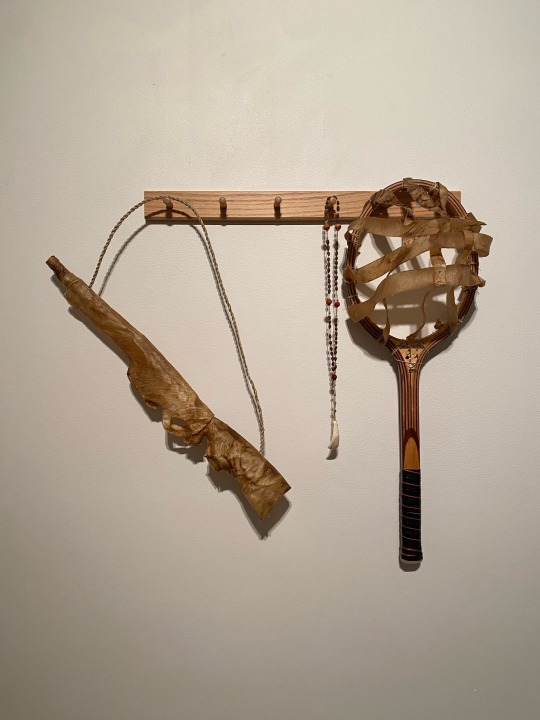

ᓄᐦᑕᐃᐧᕀ ᐊᐢᑯᑖᐢᑯᐱᓱᐣ nohtawiy askotâskopison, My Father’s Cradleboard by Morgan Possberg Denne
The New Gallery, November 18 - December 22, 2023
“Cradleboards have been used for thousands of years by our ancestors to carry and love for our future generations. They have protected us, acted as an external womb, and given us a place as children to watch our parents' culture and learn from a safe distance. I’ve always wondered if the fact that neither my father, his father, or myself was ever put in a cradleboard may have had a long term impact on our development, personhood, and our coping mechanisms to the ways that colonialism, residential schools and the foster care system has affected my family.
Now as an adult I deeply wish I could rewind the clock and put myself, and my father before me, and his father before him in a cradleboard as a child. To softly sing songs to us, give us safety, and to give us a connection to our culture in a safe environment. Maybe this would fix things. As kids when we were supposed to be kept safe and playing in the woods we were instead being prepped for the meat factory - the eternal meat grinder of colonialism.
The western world teaches us to push aside this childhood imagining and innocence - “These things can’t be undone!”, but what if they could? In another world somebody took better care of us, in another time we learned to drum and sing and dance, in another place we were listened to by adults who had the capacity to love and care for us.
These hot chest and aching throat feelings, the times of biting back angry tears and saying “It’s fine” have to count for something….right?”
“Morgan Possberg Denne is Two-Spirit millennial scoop and foster care survivor; with settler, Cree, Metis, and Chippewa blood connections. They have grown up in treaty 7 territory, and have relatives in southern and northern Ontario. Morgan creates imaginative, illustrative objects which could be seen as pieces of possible narratives, different ways to connect with the past and potential futures through layers of abstraction with no right or wrong answer. What matters to them is not accurately recreating the past or to predict the future, but rather to capture an inner truth and a possible alternative reality of colonial experiences. In a sense, creating new culture from a series of “what-ifs” and new stories / lore. Their work has been recently shown at the Confederation Centre for the Arts and Gallery Gachet.”
(Photos belong to me and the description and artist bio are courtesy of The New Gallery’s website)
[IDs:
1. a large wall hanging made from fish leather,
2. a close up of the same piece. the artwork has faint text cut out of the green tea tanned fish that reads “hey it’s not your fault, you know that right?”
3. a photo of the space showing a video projected onto several fish skins, a table with a vest and a hat made of fish leather, and on the table are cartons made from rawhide.
4. a coatrack on which are a rawhide hunting ruffle and rawhide fishing net resembling a badminton racket
5. a shelf seen in the background of image 3 containing a astro-turf shirt, a hand gun and pocket knife made from rawhide and a fish leather circular clip with a piece of dark hair hanging off the shelf.]
#my picks#morgan is a dear friend of mine <3#they taught me how to tan fish leather!#art#indigenous art#cree#métis#chippewa#canadian art#contemporary art#indigenous contemporary art#curation#artist run centre#artists#fish leather#leather#rawhide#traditional art#sculpture#installation#video art#my images
43 notes
·
View notes
Text
Bro I hate fundamentalists and culturally-fundie parents they'll say shit like "spare the rod spoil the child am I right haha yea my parents used to have to beat my ass with a switch almost everyday but I sure did learn my lesson" but like??? no you didn't??? you were hit multiple times for something you very obviously did not, in fact, learn
Like studies about how harmful even lightly spanking children is aside, you're literally contradicting yourself?? Some even admitted they got worse as they got older cause they wanted to see how far they could push their parents before they got punished
And studies not aside, you're gonna get child raising advice from the same book that tells you to stone your wife if her hymen doesn't break on your wedding night instead of the decades of research we have now?? Just say you're a bad parent and move on my guy. Skill issue
#bro I had a coworker go 'unpopular opinion I think some kids really do need beatings' and I'm like????#unprompted???? what's going on there????#well anyways I ended up going 'yea so I plan on specializing in play therapy with autistic children so I've been learning about talking#to children and the ways their parents and environment affects them'#and they're like hmmm but beating this kid with a stick after they broke something or I upset them to the point of yelling is good actually#had a boss say it taught him and his kids respect cause they were hard-headed#and I'm like?? that's fear not respect! they fear punishment! they do not act out of respect for you!#he's a conservative christian black man tho so he's like 'But Authority!' like bro I don't even respect you what are you on about#'You don't respect police and their authority?' Nope! I fear them! I do not respect cops and every cop/cop-adjacent person I personally know#has reinforced that for me#'We'll agree to disagree' Cool! Doesn't mean you're not wrong! I could believe trees aren't real but that is in fact incorrect#then he pulled out the bible verse and I was like ah okay I forgot you like 'here's how to treat slaves' book you're so right bestie#I'm totally wrong now and so sorry for doubting you and your 2000+ year old book I don't believe in <3#They'd go 'well I turned out fine!' then say something that directly contradicts that#anyways I need christians to get their grubby little hands off the current state of Child Protection and Rights in the U.S.#So we can actually start working on helping kids without the force of christian hands suffocating them#cause homeschooling and child raising by evangelicals are so fucked up bro I'm tired of this shit#I'd only stay in my current state to help children get out of that cycle since I'm in the bible belt#ex christian#religious trauma#child abuse tw
103 notes
·
View notes
Text
The thing about car-dependency is that... it sucks for people without a car. Big news, right. But, it’s not like that incentive curve is something we can just ignore. When our desire or ability to leave our house at all is conditional on being in a car, that affects all of our behaviour on every level.
Kids are the prototypical ‘person without a car’, and in a car-dependent area, they become dependent on their parents. In a normal, walkable city or suburb, children walk on their own to school, they cycle, they take the bus. Instead of needing to get parental approval - and enough enthusiasm to dedicate the time - to be shuttled around to any given activity, children walk to the park, or to a friend’s house. Even in rural areas, with the infrastructure, children will cycle to school. In a car-dependent suburb, a child is trapped in a single-family McMansion on the edge of town, forced to beg their parents to be able to go anywhere, always under supervision - is it any wonder they���d rather stay inside?
Even in a city, if it’s car-dependent, this is still an issue. When the roads are 100-decibel, 6-lane monstrosities, with cyclists expected to intermingle with traffic, and the busses stuck in the exact same jam, kids aren’t going to be able to get anywhere, assuming their parents even let them cross the street. This isn’t just about proximity, it’s fundamentally related to safety. Car-dependent places are a lot more dangerous to be in, on account of all the cars, so parents feel it’s safer for their kid to be in one of those cars. To boot, when everyone’s in a car, there are less people around, less people who can notice someone in trouble, less people who can help. When places are built with the assumption that everyone will have a car, they become places for cars, which humans can stupidly venture into.
This doesn’t just apply to children. We are all, at some point or another, a ‘person without a car’ - in fact, we’re a ‘person without a car’ most of the time, until we get into one. A lot of people would prefer to remain that way; driving a car is stressful, it takes a lot of effort and concentration, and not everyone likes it at 6AM. But, when your environment is built with the assumption you’re inside a soundproof, crash-proof metal box, that becomes a requirement. The second you’re outside of those conditions, scurrying across deafening, hot tarmac, and dodging heavy-duty pickup trucks (carrying solely one guy and his starbucks order), of course you’d decide that not being in a car sucks. But, the thing is, it’s designing for cars that made it suck, even for the car-drivers.
A place designed for cars, a place that people cannot walk, or cycle, or take public transit through, is a place full of cars - you are not stuck in traffic, you are traffic. Studies have shown that the average speed of car traffic, over sufficient time, is completely unrelated to the thoroughfare of roads. Eventually, because of induced demand, the new seven-lane arterial road will have exactly the same congestion as the two-lane it replaced. The one factor that sharply determines how slow road traffic gets is, listen to this, the speed of non-car travel. It is solely when alternatives become faster that people stop driving and free up traffic. Shutting down main street, only allowing buses through, would drastically increase the speed of the rest of the road network - because each of those buses is 40 cars not in traffic. If you like driving, you should want as many people as possible who don’t want to drive to stop doing it - and whoever you are, you should want to be able to travel without depending on cars.
When I was in the biggest depressive slump of my life, and I could barely get out of bed, I still went shopping for food nearly every day, and even traveled to visit my partner. The supermarket was 10 meters out the door of my apartment, and I could walk five minutes to either train station if I had to. It was peaceful and quiet outside. My disabled mother doesn’t like living in cities, but she loves public transit, and will always take a train ride over a long, tiring car journey - and when every store doesn’t need a parking lot twice as big as itself, whatever walking she does have to do is over a much shorter distance. When I’ve had to call an ambulance in a ‘car-hostile’ place, it has arrived inconceivably faster, on those clear roads, than when sitting in the traffic of the highway-lined carpark that makes up so many cities.
Car dependency sucks for everyone, including car drivers, but it sucks the worst for people already suffering. It strips you of independence, and forces you into a box you might not fit in - and I haven’t even touched on pollution. Car-dependency makes cities and suburbs into dangerous, stressful places, devoid of everyone except the most desperate. The only people it benefits are, really, the CEOs of car companies.
38K notes
·
View notes
Text
The fact it's not uncommon for kids to be happy when their parents get sick because that way they get to have their parents at home and spend more time together just proves this system is evil
#don't ask me for alternative systems because i literally don't know#i do know that little children crave and NEED constant attention and more often than not they are not getting it#no wonder why people don't want kids. it's not just oindividualism and the fact children will negatively affect your career#(especially if you are a woman). it's also that there is literally no way to properly raise them unless you have extended family willing to#help you or you have a stay-at-home parent. because!!! our current (questioned yes but still ongoing) system requires a nuclear#family with one breadwinner and one homemaker partner. at the same time in this economy that is basically impossible anyways#it breaks my heart just how hostile our environment is for childraising. then governments complain about low birth#rates. wow dude! wonder why that happens dude?? 🤔 surely banning abortion will help raise birthrates tho!!!!!! (yes i am being ironic)#blabla
1 note
·
View note
Text
Astro Observations XI


🟫If you are Saturn Dominant / have Aquarius or Capricorn placements you may have the feeling that when people hurt you karma takes time to reach them but when you do something karma comes quickly. You should not worry, because even if you feel that karma is late, it is twice as strong. At the end of the day Saturn rules you and is on your side. Saturn shows you that good things come late but will eventually bring you lots of satisfaction.
🟫If you have Saturn in the 4th house, the karma that reaches those who have hurt you is merely emotional. They may feel little support from their family, community or friends or you may realize how people turn their backs upon discovering their true intentions or face.
🟫Juno-Saturn aspects suggest that the native's future spouse may be older than them both in age and maturity. It is likely that they marry late compared to people around them, but it also portends that their marriage can be more stable and lasting. Future Spouse is likely to be a very demanding person with themselves, highly ambitious, responsible and can give the impression of being somewhat serious or distant at first.
🟫Having Saturn in a water sign [Cancer, Scorpio, Pisces] in the 3rd, 7th or 11th house, indicates that the native may feel that they cannot open up easily with people, that they do not take the native's problems seriously or that are not really heard by the rest of the people. These natives may feel that it is difficult to find people with whom to have deep or serious conversations, or at least find people with whom they can have these kinds of conversations.
🟫When Saturn and Jupiter are close, it tells us about a native with excellent judgement, a calm and rational person who can see two sides of the same coin. If they are in the same house, it usually augurs much success in the issues that that house deals with, it may be at their mid/late 20's due to the presence of Jupiter. It augurs good fortune and a coherent and healthy opinion and opinion regarding the issues of that house.
🟫Those with aspects between Saturn-Ceres can be excellent parents or very tactful with children. They are protective of the younger ones, preserving their innocence and their happiness. These people do not usually have many children, as it is a task they take very seriously. These people may not be the most verbal in expressing their affection, but they will always show interest and care in practical ways, giving attention and spending time with those they love.
🟫Those with harmonious aspects between Saturn and Uranus are truly dual people, they love to have fun but they know when to behave too. They are people with whom you can have interesting and fun conversations, even sometimes without any sense, but they put a smile on your face. However, if the moment requires it, they can be very rational, prudent and correct when it comes to interacting with others. They have that ability to realize when it's the right time to joke and when they should take things seriously.
🟫Saturn in the 12th house shows a person who, due to tense experiences in the past, decided to isolate themselves from people or not to seek vent or refuge in people. They see loneliness as a way to be safe from getting hurt and may not be used to displays of affection or compliments. They fear failure and being seen as weak for showing or talking about their insecurities and feelings. However, they are capable of giving others a lot of stability without even realizing it, people trust them easily and see them as strong and admirable.
🟫Saturn making tense aspects with the 4th house ruler/cusp means that the person has had to be responsible from an early age, that they have had to carry responsibilities from their parents or have given up their childhood to understand the world they had to face, because they thought no one would be there by their side to face it with them. They were able to grow up in an environment where they felt a lack of emotional support and care.


🟫Many people with Venus-Saturn aspects often struggle with self-worth, feeling loved by others, or feeling accepted just the way they are, regardless of whether the aspect is tense or harmonious. Many of them have felt at least once that their self-esteem was not the best and that they had to prove their worth somehow.
🟫The aspects between Venus-Saturn make the natives feel attracted to balanced and emotionally responsible people. Beyond the beauty of their physique and their incredible fashion sense, there is beauty in the devotion they put into their relationships and the dedication they put in every day to make the relationship comfortable for both themselves and their partner. Something beautiful that I have noticed about them is that they take the time to understand their partner and above all to get to know them. Quality time is easily one of their ways of showing love, no matter how many earrings they have or how busy they are, they will take the time to be with the person they love and enjoy every minute by their side.
🟫Saturn in Cancer can easily give others a lot of comfort, they can even project themselves as a person with a lot of emotional intelligence and a facility to understand the emotional world of others no matter how complex it is. They prefer quality over quantity and take any kind of emotional bond with people very seriously.
🟫Those with Saturn in the 1st, 7th, 11th or 12th house could be introverted in their youth and find much comfort and peace in solitude. It is very likely that their parents or other people in their family advised them to go out more or make more friends, but the reality is that they learned to feel good in solitude and were able to see the benefits of being more on their own. If Saturn is retrograde or making tense aspects with Pluto or Moon, the native sees isolating himself as a way of not being hurt or betrayed by others.
🟫Saturn in the 8th house may have difficulty opening up to people, trusting others, and feeling genuinely close to someone. They have a lot of intelligence and this allows them to observe and take a good look at the people around them before opening the possibility of being friends/couples. They are people who deep down want closeness but at the same time they want a balance, because their autonomy is very important to them.
🟫Saturn aspecting Mercury gives a person a wonderful and very capable mind, many people describe them as rational, intelligent and very logical, but they hardly see themselves that way. They may think that they are not smart enough even if the opposite is true. There is a possibility that they had difficulties for their early ages at school, but the reality is that these people can learn better on their own.
🟫Having Saturn aspecting Chiron is an underrated indicator of having the ability to help and heal other people. It may take the native longer to heal his wounds, but in return he gains an ability to listen to others, understand them and support them in their healing process. These people have a highly developed vocation to help others and could seek to have a job that allows them to be supportive of others. They can be good psychologists, teachers or they can do very well working in the human resources area.
🟫Saturn in Pisces takes their beliefs seriously, but they don't leave everything up to having faith and hoping that everything conspires in their favor. They can be somewhat skeptical and will always prefer to make decisions based on their emotions and doable things. They detect lies easily and have an easy time reading people and their true intentions.
🟫Saturn in air signs or houses shows par excellence of a great communicator, someone who knows how to hold the attention of the public, who uses the right words to convey his message perfectly. Many of them could benefit from pursuing something to do with media, social media, creative writing, or any career that allows them to communicate with lots of different people. They are very intelligent and educated people, they can have a vast and very complete vocabulary. These people have a powerful mind and are very capable of learning and understanding ideas, however complex they may be.
#astro notes#astrology#astro observations#astrology notes#astrology observations#Saturn#saturn edition#saturn in pisces#saturn in the 12th house#saturn in 12th#saturn in 8th house
3K notes
·
View notes
Note
PLEASE write about Levi’s mental state, i’m begging you
He’s faced death and precarious situations since he was born, yet he’s still standing strong and hopeful, WHAT THE HELL I LOVE MY SHORT KING
IT'S FINALLY HERE😭im sorry anon i hope you're around to see this and if u are i hope i dont disappoint
the tone in this analysis is so weird because i kept getting caught between 'this is an apa paper no contractions, academic language, double spacing -' and 'this is a tumblr post about a fictional blorbo wtf r u on'
i also use some scientific language i try my best to explain but if this turns anyone off i don't blame them because im unhealthily obsessed
*i'm a third-year undergraduate psychology student w/ a concentration in psychopathology
tw/cw: discussion of childhood exposure to sex (not assault)

Foreword
I’ve been putting this off for a while (I’m forgetful and this topic is intimidating what can I say), but being a year out from graduating with my bachelor’s to become a mental health professional, and being a Levi scholar(/hj), I wanted to give this a shot.
I wanted to dissect and examine Levi Ackerman’s mental health “currently” (as in general canon), and explain as thoroughly but as simply as possible how and why he thinks and acts the way he does.
Seeing how AOT is pretty renowned for leaving out the ‘insignificant’ details, especially character details, a good majority of my assertions and even details of his life are built off of correlations and “signs and symptoms”; meaning some things could be an aspect of Levi’s personality, or a symptom of psychopathology.
I will examine his childhood (especially his childhood), adolescence, young adulthood, and “present” adulthood, with a short summary at the end of where he might be mentally after the war.
*Lastly, I don’t like it when things I say about a series or character are taken as fact or make it implied that someone else’s thoughts are “wrong”. This is partly built on headcanons anyway, which are influenced by my own experiences. Don’t take away from this that this is me telling you what to think.*
Childhood
The most important period of development occurs in infancy and childhood, especially from the ages of 3-6. This is when a child learns where to find security, love, and basic skills, gaining stability as they develop.
Well, Kuchel died when Levi was 4.
Maternal Love / Learning Empathy / Anxious Attachment Style
Levi was born into deep poverty within a violent unwelcoming environment. Basic physical needs must have been very hard to meet (i.e., consistently fed enough, a clean environment, no physical threats). And where Levi was born is like the dictionary definition of a bad environment for a small child, excluding only his mother’s care and love.
As it’s generally understood in canon (and suggested from Levi’s special backstory manga so far) she was a caring parental figure early in Levi’s life that loved him unconditionally. We can conclude that Kuchel did everything within her power to compensate for both parenting Levi alone and shielding him the best she could from his horrible surroundings, teaching the kindness, goodness, and love that Levi would internalize and go on to strive for for his entire life.
As far as we know, no other children lived in the brothel. Socialization is just as important for a young child as receiving love. With this isolation, it’s extremely difficult to learn how to connect to other people, or pick up on social cues. Levi would’ve never learned how to interact properly with his peers—aside from use of aggression and violence which Kenny would go on to instill in him.
With the danger/anxiety imposed by strangers, mostly if not entirely men, he would turn to his mother for comfort all. The. Time.
And she would give him that support and affection of course. This early motherly affection is integral to child development: a child who receives empathy and affection is subliminally taught how to feel and express empathy towards others.
While Levi’s surroundings were dangerous, lonely, and chaotic—traumatizing enough for a toddler or young child—Kuchel provided a safety net from that, so I think that Levi developed an anxious attachment as a child: exhibiting clinginess, excessive fear of abandonment, and an excessive need for security and/or reassurance.
Paternal Trauma / Potential Androphobia
Born and living in a brothel, we can assume that Levi was probably seen as a burden and a mistake by others, especially by men (both the likely majority of her customers and her boss).

AOT ch69; Before the Fall, ch34
This is likely in contrast to the women (those living and working in the brothel like Kuchel). They should know Kuchel if not as friends, then acquaintances who could empathize for her and her son.
There’s an obvious trend here. If Levi is going to feel fear/danger/anxiety because of men, he should have a general aversion to men and-or the behavior of men who he encountered as a child. This is impossible to know for sure or in meaningful detail, but it seemed to be resolved by the time he became an adult if so.
Although Kenny in his words was no more than Levi's teacher, Levi did see him as a father figure.
The subject of Kenny will be expanded on later, but it's clear Kenny in no way resembled a father, who also would go on to abandon Levi (at the age of 11 or so). Children without father figures tend to struggle more emotionally, psychologically, and socially. Specifically, (especially boys) tend to exhibit intimidating/aggressive personas to compensate for resentment, fear, and unhappiness.
Sexual Trauma (Tangent, Probably)
This is unconfirmed but a likely trauma Levi went through: exposure to sex as a child. There’s no way to confirm what he experienced, so I’ll function on ‘probably’s’ and ‘most likely’s’.
Because Levi and Kuchel only lived in one room, other rooms in the brothel should have belonged to other women, and he was at the oldest four, I wager that he was babysat by women who Kuchel knew and/or was made to hide somewhere while she worked, such as in a cabinet.
(for reference)
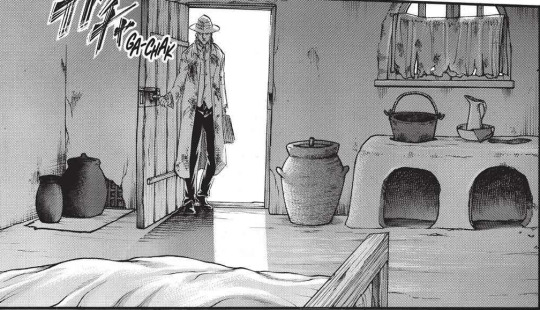
AOT ch69
The odds are high that he was exposed to the aftermath of sexual violence (i.e., marks seen on his mother), and the sound or smells that have to do with it. That young, he wouldn’t know what it was, but he should have realized later as an adolescent.
In general, children regardless of gender exposed to sexual content usually experience early puberty (which is just as likely for impoverished children, or children who experience chronic high-stress in general); issues with intimacy; become desensitized to high-risk behavior; negative/inaccurate expectations about sex and relationships in the future; influence inappropriate behavior with other children or adults; sex addiction.
This is especially relevant to Levi’s fear of closeness/intimacy in the future. Exposure to sexual situations—possibly not including CSA in his case—very early in life inflicts on a child emotions and stress they don’t have the intellect or reasoning to process or understand. An extreme aversion to interpersonal relationships, especially physical ones, results.
This stress Levi must have felt, being powerless to this happening to his mother, is a different beast. Children aren’t capable of handling high levels of stress, and so the brain will automatically create coping mechanisms: dissociation (a severe form of “zoning out”; observing the self “from the third person”; numbness; the feeling of living in a dream), excessive daydreaming/overactive imagination, symptoms of PTSD (nightmares and terrors; flashbacks; spontaneous activation of fight-flight-freeze associated with anxiety; excessive worrying/fear; loneliness/self isolation). PTSD will also be prevalent in Levi’s later life, which I’ll delve into later.
Inappropriate behavior and sex addiction are also highlights for me because they shouldn’t exist in him based on Levi's personality and behavior throughout the series. In my opinion, Levi ought to associate sex with pain, shame, and violence; he does see it as an ordinary job—a means to an end. He should be desensitized to sex as a concept, but associates it personally with shame, sadness, and pain, possibly feeling disgust towards it. So it is highly likely that Levi in every stage of life following this experienced sexual repulsion (usually associated with high anxiety towards sex), a low libido, or a lack of sexual desire entirely.
From a trauma perspective, he could avoid sexual topics of conversation, sexual settings (i.e., brothels), or an array of things which are sexually suggestive or he as a child possibly associated with sex (i.e., cleavage, panties, specific touch). Similarly, he might avoid direct reminders or have a post-traumatic reaction to them, such as anxiety or flashbacks (i.e., the sound of a bed creaking, the sight of wet clothes).
Importantly, it can be concluded that sexual violence was often exhibited, and the idea would be ingrained in him that sex, like everything else besides his relationship with his mother, is “give-and-take”, “victim-and-attacker”, and learn to be repulsed by intimacy. This impacts his willingness for later friendships and relationships as we’ll see later.
Early Abandonment & Early Exposure to Death
As Kuchel’s health deteriorated, Levi’s sense of security would break down. Availability of shelter, food, and emotional support would be even less secure than before. He might have been providing for Kuchel for some time, even, as it can be gathered that he received little to no help from those around him while she was sick. To whatever length he had to take responsibility and both fear for Kuchel, this would cement a sense of responsibility and guilt in him from the age of just four years old.
He will fail to save her—regardless of the fact that that’s not his responsibility in the first place; a child wouldn’t understand that—and then lose her with nothing he could do to even cushion the blow.
How powerless he must’ve felt. How hopeless. How likely is it that Levi found comfort in joining her? A child his age wouldn’t be able to comprehend death, basing our understanding on Piaget’s theory of cognitive development. To summarize, at the age of six or seven, children aren’t capable of complex, abstract thought like death or the finality of it. But Levi had to learn early.
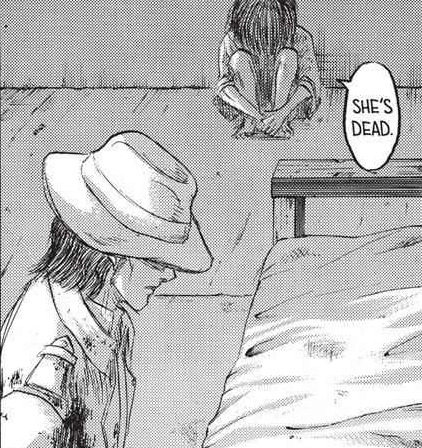
AOT ch69
This will be center in his “clean-freak” tendencies later.
Adolescence
Most of this section is going to be rather vague again, but we already got the bulk of that over with in childhood!
Emotional Train Wreck / Lack of Identity
It’s hard to notice if you’re not paying attention, but in every scene we’re shown with Levi after his mother dies but before Kenny leaves, he’s wearing some variation of his mother’s one dress styled into a shirt. He loves her endlessly, even or especially in death. And part of cherishing her memory, to him, should’ve been taking after her as much as he could.
That’s how to explain why he didn’t become a cruel person (Kenny for instance) as he grew into a teenager, even though much of Levi’s outlook and behaviors come from him (ch57).
The more pertinent question is how extreme violence, reinforcement of the idea that that violence is power, and Kenny’s total (or most likely total) lack of communicated emotional connection affected him.
Levi would still desperately want that connection deep down, especially with his mother gone. This is a major reason why Levi sought to get stronger to please Kenny. For chronically abandoned people, that continues into adulthood and even beyond. A hole inside which can't be filled.

AOT ch69
Chronic loneliness—like I explained before��basically explains his aloof nature and awkward disposition. It’s not that Levi feels as detached as he looks, but he doesn’t know how to express himself or open up. He wouldn’t learn how to process his emotions, let alone talk about them. He’s basically emotionally stunted and immature in impersonal relationships (between friends and especially in regards to intimacy).
The Underground’s environment also makes him socially awkward, rude, of course stoic/not very expressive, and blunt. Levi was forced to become extremely observant of people to suss out their intentions, remaining vigilant of his surroundings at all times.
Levi doesn’t even get affection in any sense anymore. He doesn’t get a hug or a pat on the back, and he certainly doesn’t get a shoulder to cry on.
If anything, Kenny would punish him for showing weakness. Vulnerability is weakness; weakness is death.
What results is a continuous and boundless sense of emptiness inside that can’t be filled. He’s plagued by a chronic sense of unbelonging and loneliness. There’s no time or opportunity to develop “normally” as an adolescent. Socialization is limited at best; thinking of his place in the world is irrelevant when his one and only most pressing goal is survival; he doesn’t get to explore hobbies or interests.
OCD Propensity
One “interest” Levi is passionate about is cleaning, at least. Disease is what caused his mother to die. The easiest cause to point to would be their disgusting surroundings (although, Kuchel was infected by a customer). It is canon that Levi’s love of cleaning comes from "his personal experiences". In that interview, Levi first specifically references the important of fighting disease.
In other words, his "clean freak" nature comes, primarily, from the death of his mother: Filth -> disease -> death, and abandonment by extension.
His mother would’ve encouraged him to keep their room clean. There were times he or she had to have come down with something and dirtiness was the cause. On top of Kenny’s enforcement to keep up “clean” appearances to garner respect from everyone else in the Underground.

This in particular is extremely relevant to his mental health. When someone feels out of control of what is happening to them, especially in a recurring way, and especially as a child who doesn't yet know how to feel stable in an unstable environment, they look for something to control. It can be weight, bodily functions (blinking, breathing, etc), dominance over others, or cleaning, for instance.
Fear of disease, the urgent need to have control, and the basic need for stability makes it obvious that Levi would become obsessed with cleaning. And moreover, developing OCD (Obsessive Compulsive Disorder). I’ll go deeper into this diagnosis later.
Lack of Self Worth
Despite the acknowledgment throughout canon that he trusts in his own strength, it wasn’t always that way.
Canonically, Levi sought praise from Kenny by showing his strength because that was the only thing he received praise for. The conclusion Levi came to once Kenny left him was that he wasn’t strong enough (wasn’t good enough) to warrant staying with him.
In conjunction, Levi’s first conclusion was that he did something wrong, not that Kenny possibly had some obligation that forced him to leave the Underground, pointing again to his own lack of self-worth.
This scenario created a complex in him, the very root cause of Levi’s pain, the very foundation of what Levi would go on to prioritize in adulthood. If he isn’t useful to those he wants not to abandon him, he’s worthless. He’s only useful when he shows his strength. Every other aspect of him like his interests is either irrelevant or bland by default in his eyes.
He would go on to make it his mission to try his best to be good enough in order to save and protect the lives of others, but foremost those he cares about.
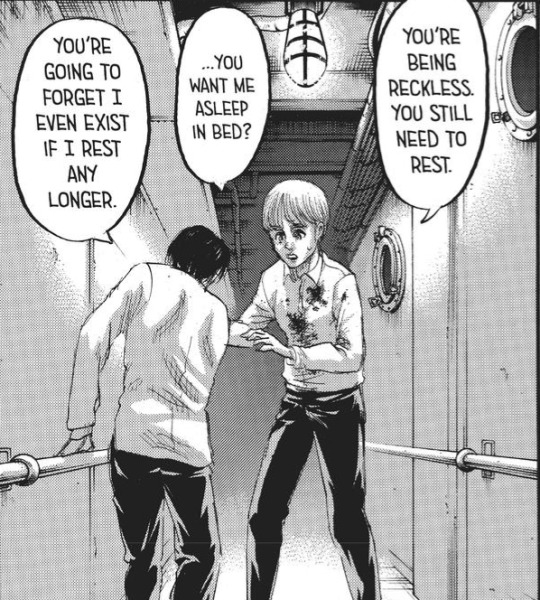
Young Adulthood
Our first exposure to Levi as an adult is in A Choice with No Regrets, his OVA/backstory.
(By the way, I’ll be basing this analysis off a mix of the manga and the OVA.)
Emotional Immaturity/Affective Dysregulation
Generally, Levi’s defining negative character trait as a young adult is his emotional immaturity/anti-social behavior. Yes he’s grumpy and rude which is always indicative of him, but he’s very quick to anger, too. He cursed at the Squad Leader who offended him (by assuming that because he, Isabel, and Farlan are from the Underground, they’d be dirty), and argued furiously with Farlan that he would kill Erwin—not because it was required for the job, but because he disrespected him—for a few examples.
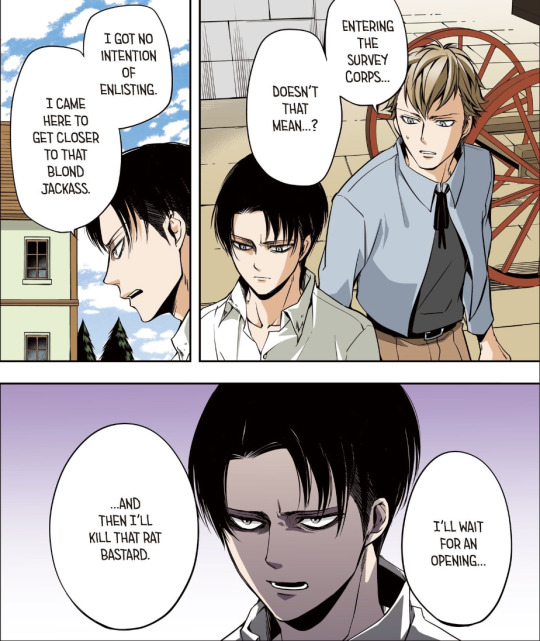
ACWNR ch2
He tended to be arrogant, too. Such as when he ultimately called a Scout who had experience with the Titans stupid for telling Levi to hold his swords in a certain way. He spoke to every officer the same as he would anyone on the street, having a remarkable lack of basic respect for authority. He was insistent on distancing himself from the entire setting and structure of the Scouts as much as possible, both to not get attached, and he found their mission childish/foolish.
He’s rather selfish. There is nothing Levi cares about genuinely more than Isabel’s and Farlan’s lives and the job that will set them up with a good future. Farlan’s advice is the only one’s he takes and the only judgment outside himself that he considers, such as when Farlan asks him to not cause trouble with authority to keep a low profile, but even then he acts stubborn. Levi trusts nobody wholeheartedly except himself (until later in ACWNR).
There’s a cognitive dissonance in him. Growing up, and still as a young adult, Levi’s headspace is marked by fear and uncertainty, with his power as his source of confidence. The first time he kills a Titan (with Isabel and Farlan), he uses too much gas because he refuses to potentially risk his friends’ lives; when the expedition is upcoming, he abruptly tells Farlan and Isabel to find a reason to stay back, and that he’ll complete the dangerous part of the job on his own.
Levi is full of repressed fear and uncertainty. He hides and/or buries all of it for the sake of self-preservation both emotionally and physically.
Antisocial Personality…?
It’s extremely interesting how a character as selfless, heroic, and empathetic as Levi exhibits antisocial symptoms. I’d even argue that if his childhood was spent entirely without his mother figure, then he might be a dictionary definition of ASPD (Antisocial Personality Disorder).
People with this disorder live day-to-day under the constant assumption that whoever is around them is “out to get them”/searching for a weakness to exploit. Humanity is made up of only prey and predators; morals are completely subjective, perpetuated by the society that surrounds them. This constant need to defend oneself, the effect of the exact trauma the potential sociopath experienced, combined with a muted emotional spectrum, results in a complete disregard of everything, including people outside of themself. They might believe they’re entitled to comfort or admiration, but overall, they’re intensely self-serving, often aggressive, and ruthless.
Because Levi for instance learned to rely on violence both for “love” and survival, then he might fall on violence to manipulate a person or situation into serving himself. I see reason to believe that Levi could have grown into worse than Kenny’s image if it weren’t for his mother’s influence.
However, the greatest cause for deniability is Levi’s wide emotional spectrum (especially including empathy and shame), while a lack of shame is the most significant marker of ASPD . (It is arguably one of many testaments to his strength that a victim of so much suffering, violence, and cruelty could become a man as empathetic as him.)
However, these tendencies may still be relevant: A sense of arrogance—both to the way Levi thinks of some who he perceives as weak and live without good morals—lacking issue with using deceit or violence to attain a goal, and living outside the rule of authority.
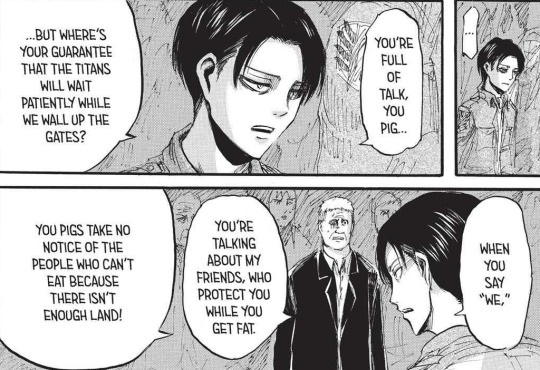
I go into more detail about this idea here.
Conclusion
As is true in general, there’s very little to say of mental development once someone has reached their early–mid-twenties. What we know of Levi’s young adulthood does reinforce his fear of abandonment, but he finds a cause where his strength and compassion can be “put to good use” and give to him a life that is worth living.
Conclusion: the ‘Present’/Diagnoses Overview
C-PTSD (Complex Post-Traumatic Stress Disorder)
Levi’s emotional dysregulation (i.e., inability to sit with and process negative emotions), his difficulties in relationships, insomnia, negative worldview, absent sense of self, and finally, his persistent sense of unworthiness/worthlessness are all indicative of C-PTSD. It’s distinct from PTSD in that he didn’t endure one short-term traumatizing event, but he grew up surrounded by trauma and saw it as normal (e.g., gang violence, extreme poverty, death of a parent, (more presumably) physically and emotionally abusive parental figure). Levi as a child developed no understanding of a nurturing, secure environment.
Negative/Absent Sense of Self
I’ve talked about this at length already, but it’s worth noting how Levi’s perception of himself must have changed when it was revealed that he is extremely strong physically not from his own efforts as much, but because he’s an Ackerman.
His self-confidence and self-worth have always been built on the foundation of his strength. He’s useful if he’s strong, so he’s worthy if he’s strong. Along with the extreme high pressure his goal to kill Zeke put on him in season four, he might have gone to extreme measures to compensate for his strength he might have felt was “unearned” (such as excessive exercise for example). This is an aside, but it was a blow to him for sure.
Emotional Dysregulation
The causes of emotional dysregulation generally which he experienced are as follows: early childhood trauma, feelings ignored, judged, or invalidated at a young age, and physical and emotional child neglect. Beyond his first four years of life with his mother, Levi experienced all these things (early exposure to sex and likely exposure to domestic violence aside).
It’s important to focus on emotional neglect specifically, when any and all perceived “weakness”, no matter how small, is unacceptable to Levi. He will never ask for help (being independent to a fault), he can’t define or process his emotions, and it doesn’t occur to him—and it could be a shock—when he learns that his friends care about him, not him insofar as how useful he is.
As an adult, Levi appears to be emotionally mature, but I argue that this isn’t the case. It’s more accurate to say that he has better control over his emotions (in that he buries them or ignores them) with a mature outlook because of all his experiences with suffering.
Similarly, he’s not outwardly emotional not because he’s antisocial (as related to ASPD, not introversion), but because he’s so “emotionally constipated” that he’s numbed the vast majority of the time.
Relationship Issues + Fear of Abandonment
Because of his fear of abandonment and impaired emotional intelligence in close relational conflict, he’s extremely passive and/or passive aggressive. In order to avoid potential abandonment, he doesn’t go out of his way to win major arguments—such as threatening to break Erwin’s legs if he didn’t stay away from the expedition in season three, but ultimately giving in. He’s also more likely to sneak petty insults into arguments, give “silent treatment”, slam doors, etc. His kindness and exceptional empathy shouldn’t let him be physically or overly violent.
These are likely additions to why Levi doesn’t foster many close relationships.
Fittingly, as a child I thought that Levi might have had an anxious attachment style (clingy, excessive need for security), but as this possibility for security was removed entirely, and he was taught to not rely on others, he would develop more of an overt avoidant attachment in adulthood in combination (fearful-avoidant): making very few emotional demands—even though he has needs—withdrawing when there’s conflict, acting aloof yet fearing abandonment, having difficulty expressing emotions he feels intensely, and fear of depending on someone else.
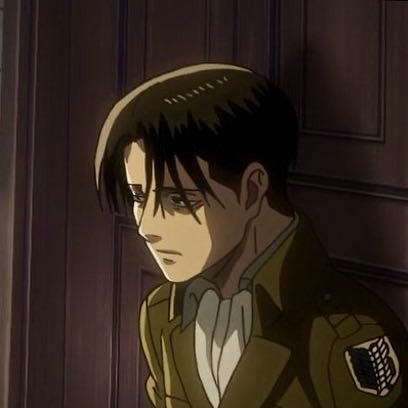
Anxiety
His cool-headedness even in the heat of battle/war (other factors like experience aside) is exactly what you would expect from someone diagnosed with C-PTSD; he’s accustomed to chronic high-stress. But small stressors (i.e., a change of plans) are overwhelming and make him quick to anger/excessive annoyance.
OCD
Emotional dysregulation is also closely associated with OCD.
OCD is much much more than being concerned with keeping clean or organized. OCD is an anxiety disorder composed of anxiety-related obsessions and compulsions, such as frequent and disturbing thoughts or images (intrusive thoughts). These attempt to be managed through rituals (i.e., handwashing, counting in patterns). Although symptoms will fluctuate with anxiety, OCD at its baseline is a distressing disorder.
Since he was young, Levi should have had an incessant need to be in control at all times. A shining example of this is his mother’s death, an incident he couldn’t control but included dirtiness/disease as a cause he could pinpoint, so this anxiety with dirtiness becomes a major obsession, and the compulsion is cleaning. (Putting aside the fact that Levi enjoys cleaning by itself too.)
It’s a widely-held belief that if Levi has OCD, it’s contamination OCD, as it specifically has to do with an obsession with dirtiness and a compulsion in cleaning (i.e., damaging handwashing, ritualized bathing that may take hours). However, based on the multitude of times Levi was covered in blood and remained unbothered by it (Titan and human), and in fact the obsession’s lack of relevance entirely during urgent missions/situations, contamination OCD is simply not plausible. Instead, it’s general OCD.
There’s no way to know for sure, but I don’t see his OCD as mild or severe. Levi is an extremely orderly and balanced person, so it can be concluded he must have things done a certain way, routinely, organizational, or planned; when the dirtiness is “negative” (i.e., Titan blood, blood on a knife he used to kill Isabel’s attackers), he is never more rigid with cleanliness; it’s probable he suffers intrusive thoughts (likely of the violent nature), a fear of contamination, and/or counting ritualistically, but the most obvious compulsion is cleaning. He might have sensory issues, such as disgust if he happens to brush shoulders with a stranger; aversion to particularly bright lights, irrational rage towards “mouth sounds” (i.e., chewing, coughing, swallowing), etc.
EDNOS (Eating Disorder Not Otherwise Specified)
Levi should have a complicated relationship with food to say the least.
In the realm of eating disorders, EDNOS is sort of a catch-all term when an individual doesn’t qualify for the diagnostic criteria of anorexia or bulimia, and it encompasses lesser-known eating disorders like Pica. It’s the most common diagnosis for clinical eating disorders.
I already covered how integral the early years of life are, and beginning at a young age, if children aren’t given a basic need like food, and they must seek out food on their own, it becomes an anxiety deeply rooted in the brain regardless of how well-fed they are when they’re older. There will always be an urge to have food available. Levi’s years in the Underground were spent either actively starving, or going about every single day having acquiring food as top priority. He was a young adult when he left, so it’s impossible to unlearn this (without extensive therapy, which Levi doesn’t seek). It’s similar to compulsions found in OCD: even though he logically knows that there will be a dinner after lunch, it’s impossible to put aside this worry.
That may mean always having food stashed, eating too much—especially in his early years Aboveground when he’d eat as much food in a day than he’d eat in a week Underground— stealing food, or eating way too quickly (as someone who lived in a place where food was considered something of a luxury resource and threatened being stolen at any time).
The latter factor contributes to Levi’s suggested preference to only eat alone—joining the fact that Levi only eats with Erwin after expeditions. Eating in front of others should be considered a weakness to him.
As time passes with this easy access to food, combined with his extremely narrow sense of what makes him “good enough”, his relationship with eating may become toxic. Especially when the stakes of his worthiness are so high—literally life and death. He may think that he’s privileged to eat at all, and when he feels worthless, he restricts himself from that “privilege”.
He may be so accustomed to the feeling of hunger, that it doesn’t immediately register with his mind when he is hungry.
Lastly, he may have a generally low appetite. This is often associated with depression, but depression is comorbid with C-PTSD.
Misc.
Some tangents/miscellaneous speculation about Levi’s psychology:
Queer?
Sexuality is formed and shifts due to a wide variety of factors, which most if not all are terribly understudied: genetics, hormones, and your environment/experiences. So again, my speculation.
With his fear of close relationships and negative experiences with sex, I think he should land somewhere on the queer spectrum, specifically under the asexual or aromantic umbrella (i.e., pansexuality/being panromantic (attraction to personality) and demisexuality/being demiromantic (attraction only to those he has an emotional connection to)).
MDD
The odds of Levi having MDD (major depressive disorder/clinical depression) are iffy. Most if not all of the symptoms are comorbid with childhood trauma and C-PTSD: Such as persistent apathy, guilt, and/or discontent; sleeping too much or too little; lack of energy; reduced or heightened appetite; irritability.
Oftentimes, depression, C-/PTSD, and related mental illnesses cause unexplained physical pain, such as back pain and occasional tension headaches. “Stress hormones” like adrenaline are built-up in the body, and usually persist without physical therapy and-or medication (Disclaimer this mention is based on nothing more than Levi always standing with at least one hand on his hip).
Body Language
Similar can be said of his body language from a cognitive perspective. The vast majority of the time, Levi has himself closed-off in some way, usually by crossing his arms to protect his chest; a subconscious barrier between oneself and another person.
Also see this official art of Levi asleep.
Afterword
We’ve known it’s not just Levi’s physical strength and skill that makes him the strongest, right? It should take immense mental strength to make it day-by-day dealing with the trauma and issues that he does, but not only has he survived and continues to, but he lives heroically, selflessly, with the wellbeing of everyone around him as a top priority. He buries all of his pain by moving forward always and without exception regardless of how painful the present is. Living with “no regrets” should in mental respects be a guise for pushing his trauma down, too; there’s just no words that can properly do Levi’s resilience justice.
Part of me wants to go into detail about his later adulthood, but given how very little we know (right now), I think it’d be too speculative.
However, based on what we have seen at the ending of AOT, it’s comforting to know and plain to see that Levi wasn’t defeated when he “lost” the reason to be so strong, and even his strength itself; he didn’t lose his love for his friends nor of life.
In middle age, based on Erikson’s psychosocial stages, the conflict that should enter Levi’s life is the idea of generativity versus stagnation. He seems satisfied with his life despite the negative effects of all he went through—grief, physical disability, inevitable mental scarring—and he’s still concerned with helping others, especially the younger generation in a world after the overwhelming devastation that was the Rumbling.
My speculated psychopathologies/diagnoses of Levi:
C-PTSD (insomnia prevalent)
OCD (contamination obsessions)
EDNOS
#levi aot#snk levi#levi ackerman#levi attack on titan#captain levi#captain levi ackerman#aot levi#aot levi ackerman#attack on titan levi#aot meta#levi heichou#rivaille heichou#levi rivaille#rivaille ackerman#lance corporal rivaille#levi snk#levi.thoughts#aot#attack on titan
249 notes
·
View notes
Note
Hihi again<3
Do you have any parenting hcs for our bg3 companion girls?
Hello again!! absolutely!!!
--------------------------------------------------------------------------
Shadowheart:
Shadowheart is fiercely protective of her children, willing to do whatever it takes to keep them safe from harm. She may initially struggle to express her affection openly, but her love for her children runs deep, and she would battle Shar herself to ensure her children's well-being.
As a cleric, Shadowheart provides her children with spiritual mentorship, guiding them through the teaching of her faith and offering support in times of spiritual need. She encourages them to find their own connection to the divine and helps them navigate moral dilemmas with wisdom and compassion.
Shadowheart imparts her knowledge of strategy and combat tactics to her children, teaching them how to defend themselves and strategize in difficult situations. She believes in empowering them to face the challenges of the world with courage and resilience.
Shadowheart believes in fostering independence in her children, encouraging them to think for themselves and make their own decisions. She provides guidance and support along the way but allows them the freedom to explore their interests and forge their own paths in life.
Lae'zel:
Lae'zel instills discipline and rigor in her children, training them in the ways of combat from a young age. She believes in the importance of strength and skill and pushes her children to excel in martial pursuits, instilling in them a sense of pride in their warrior heritage.
Lae'zel values traditions and heritage, passing down the customs and rituals of her people to her children. she teaches them about their culture and the githyanki prince. She teaches them about their cultural identity and instills in them a deep respect for their ancestors and the traditions that define their community.
Lae'zel encourages ambition and determination in her children, urging them to set lofty goals and pursue them with unwavering determination. She pushes them to strive for excellence in everything they do, believing that greatness is within their reach if they are willing to work for it.
Lae'zel fosters a spirit of adventure in her children, encouraging them to explore the world beyond the confines of their home. She believes in the importance of experiencing new cultures and environments and encourages her children to seek out new adventures and challenges.
Lae'zel serves as a mentor to her children in matters of combat, teaching them advanced fighting techniques and tactics. she instills in them a sense of honor and duty on the battlefield and prepares them to face the dangers of the world with courage and resilience.
Karlach:
Karlach encourages her children to explore their creative talents and express themselves through art, music, and storytelling. She provides them with opportunities to artistic expression and fosters a love of creativity and imagination in their lives.
Karlach is deeply attuned to the emotional needs of her children and provides them with a safe and nurturing environment to express themselves. She listens to their concerns with empathy and understanding and offers them comfort and support in times of distress.
Karlach fosters a sense of curiosity and wonder in her children, encouraging them to ask questions, seek answers, and explore the world around them. She believes in the importance of curiosity in fostering love of learning and encourages her children to embrace new experiences with open minds and open hearts.
Karlach loves to show her love with her children, she loves teaching them the old phrases and words her parents taught her. Karlach will teach her children to appreciate the world around them. She will take them on hikes and would teach them about the plants and animals they encounter, and encourages them to develop a sense of stewardship for the environment
Above all Karlach's love for her children is unconditional and unwavering. She supports them through triumphs and challenges alike, celebrating their successes and comforting them in times of need. Her children know they can always count on her for love, guidance, and unwavering support.
--------------------------------------------------------------------------
I hope you enjoyed, i really enjoyed doing this request!!!!
#bg3#baldurs gate 3#karlach x tav#karlach#karlach x reader#karlach bg3#bg3 karlach#bg3 shadowheart#karlach cliffgate#tav x shadowheart#shadowheart#shadowheart x reader#shadowheart x tav#lae'zel x tav#lae'zel x reader#lae’zel x reader#lae'zel#laezel
152 notes
·
View notes
Note
Loki had no right to envy thor and praise the ground frigga walked on when odin was a shitty dad to all three of his kids
Alright! Time to talk about something that is not discussed enough: jealousy between siblings that grew up in parental abuse/neglectful situations.
As someone who grew up in an abusive/neglectful environment and has siblings, + knows many people who have the same set of parameters, jealousy between siblings is sort of natural byproduct because guess what!
Parents never, never, never abuse/neglect every kid in their family in exactly the same way.
My parents were awful to my siblings in ways they weren't to me, but I'm jealous of the good things they did to for them because they didn't do that with me (i.g. when I was looking for a job last year, i got yelled at every time I failed; when my sister was looking for a job, my parents were very present for her emotionally and assured her she was doing the best she could when she didn't get the job. Their patience was absurd to me) Stuff like that + bigger things. If we were neglected/abused in exactly the same way, my sister would have gotten yelled at, too, or I would have gotten support, but it didn't happen like that because parents don't DO that, even in healthy environments, parents are never the same parents to their kids.
Likewise in ways they were awful to my siblings, they were LESS awful to me, so my siblings are jealous of that. when you're raised in an environment where you have to fight for love and scraps of affection when your parents are in a parenting mood, you are always jealous when someone manages to get the scrap. Like yes, your siblings (often) become your closest friends and confidants in that situation because there's no one else who understands it like they do, but because the abuse/neglect is so different for everyone, it causes resentment.
So here's the thing: Thor, Hela, and Loki were not abused in the same way. Loki can have an amazing, healthy relationship with Frigga (he does not, but we can pretend for a moment) and Thor is fighting for scraps of love from her. (Parents and their parenting moods are weird) and Thor can resent Loki for that because he needs a mom too. Thor can get all the attention from Odin and have a healthier (it is not healthy) relationship with Odin, and Loki can resent him for that, even though he has a "good" relationship with Frigga, because he still needs a dad. Hela can have been banished and raised as Odin's sword and have NO good or even good-ish relationships with Frigga and Odin and she resents Thor and Loki for that because she needed parents.
But is all their trauma valid even though the WAY they were traumatized is different? Yes. Can we look at them and objectively choose the "worst" victim between the three of them? No. We can't. Because different things traumatize people differently. And why should we? it's not a competition. Even though parental abuse/neglect has a tendency to pit siblings against each other despite (usually) said siblings best efforts otherwise, it is NOT A COMPETITION.
Loki has every right to be angry with Odin over what he did to him even though Odin was terrible to all his children because IT! IS! NOT! A! COMPETETION! ABOUT WHO WAS ABUSED MORE! The most suffering victim doesn't "earn" the right to be traumatized. everyone was traumatized. Everyone gets therapy. They're just going to talk about different things in therapy and THEY ARE ALL STILL TRAUMATIZED.
I guarantee to you that if they were real people, Thor would absolutely be jealous of Loki and Hela. Loki would be jealous of Hela and Thor. Hela would be jealous of Thor and Loki, EVEN THOUGH all of them are being abused, it's just the fact they're not being abused in the same way.
And this is WHY I am always in awe of their relationship in canon because it is one of the best written sibling relationships under abuse I have ever seen because it is REAL. (The Umbrella Academy s1 did this spectacularly, also, btw) Sibling relationships under abuse are so so so messy because everyone is in survival mode and it causes SO MANY issues.
and guess what! Everyone IS jealous of each other
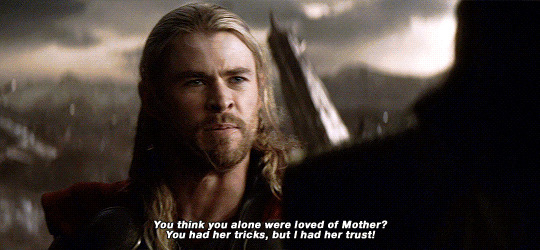
^ Thor's resentment that he wasn't taught anything by Frigga (listen to the way he says this, he is very jealous and bitter, i WISH they had poked this more)

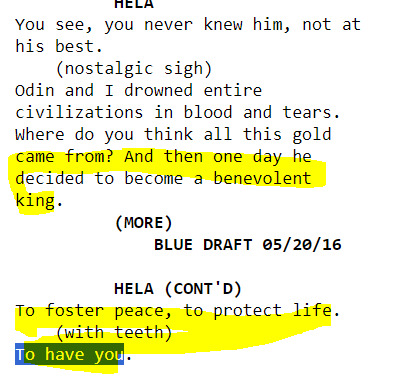
^ hela jealous odin replaced her with Thor
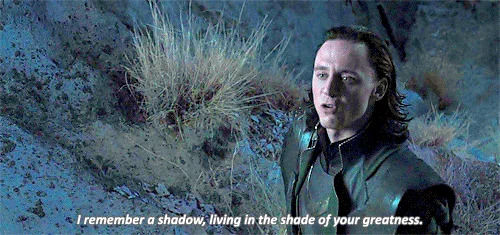
^ loki jealous that Thor got more attention than he did from their parents + people in general (all this attention wasn't a good thing) (funnily enough, for someone who is said to be SUPER jealous, this is the only time in canon I can think of Loki actually admitting that he is)
so anyway, sibling resentment HAPPENS but everyone is still abused/neglected and it all sucks and EVERYONE deserves therapy. And hey, if Frigga decided to actually be a parent to one of her kids (she didn't) then I am HAPPY because at least SOMEONE got a parent, even though Thor deserved a mom just as much as Loki did.
#thor meta#loki meta#hela meta#hela#loki#thor#odin's a+ parenting#child abuse#we do not talk about sibling relationships and abuse enough#it would have helped me so much when I was younger if I knew any of this instead I just thought i was a monster#turns out i was just 13 and exhausted
161 notes
·
View notes
Text
Deuce and Silver: *Are good boys who always do their best to help their parents and make them proud
🌸: "Aww, people like them who have a good relationship with their parents are wonderful. You just know they're raised in a good environment. They're probably the type to raise their own wholesome family too."
🐉: "..."
- Sometime later -
🦇: "Malleus, what are you doing? I am hardly disabled yet."
🐉: "It is fine. Allow me to take care of you just as you cared for me all this time, Li-- Father."
🦇: "Father..! By the seven, what has gotten into you?"
🐉: "True family needs no blood connection to establish an unbreakable bond."
🦇: "I... Oh dear, my eyes feel somewhat watery. Apologies if I do something embarrassing. Gracious, is this sudden onslaught of happiness an indication that I am indeed to pass on soon..?"
🐉: "... Don't say that. You shall live on to see the children of my children bear their own children."
🦇, sobbing: "Of course, of course. Forgive this senile old man."
Truth be told, Malleus' intention for this sudden act of affection wasn't at all kind and pure. But, for some reason, what started out as a farce quickly bloomed into the true feelings that he always wanted to say out loud.
For you to unintentionally help him out like this... You really were the strangest guiding light appearing in the most unexpected ways.
#THIS WAS SUPPOSED TO BE COMEDY LMAO#might draw this out if i have enough energy after my exams#twisted wonderland#malleus draconia#lilia vanrouge
782 notes
·
View notes
Text
Thing to remember if you are writing anything involving class and working class people, including game design: poverty is a major cause of AND a major result of disability and chronic illness.
If you write something where every working class person, every person who comes from a working class background, or every poor person, is healthy and physically strong, and just as much or more so if you bake that into a game system by giving people from those backgrounds high Health or Strength stats, you are making an active *choice* to erase a substantial part of the experience of and results of poverty.
Disabled people exist *everywhere*. In every setting - even when there’s magical healing or nanobots or whatever, frankly, erasure of disabled people and the experience of disability is an active narrative choice to erase us. So we *certainly* exist in *every* real world present-day and historical setting, and the fact that you don’t think so is due to active cultural erasure of disabled people and the experience of disability.
While disability is *absolutely* present in every strata of society, the experiences of disability and poverty are deeply and inherently entwined. Given that the vast majority of people are workers, and primarily physical workers throughout history - and if you don’t think disability massively impairs your ability to do call centre work, let alone food service, care work, retail work, or most of the other low-paid jobs in our current service economy, even if they are not habitually classified as heavy physical work, you need to massively expand your understanding of what disability actually is.
Poverty is generational in all sorts of ways, but one of them is that gestational and childhood poverty affects a person for their entire life. There are so many illnesses that one is predisposed to by inadequate nutrition during gestation and childhood, or by environmental pollution during those times (most likely in poverty-stricken areas). Disability and illness in parents and family members so often sees young children go without essentials and older ones forced into forgoing education and opportunities so they can care for family members or enter paid work. It’s a generational cycle that has held depressingly true in urban and rural areas, and that’s before even considering the impact of genetic illnesses and predisposition to illnesses.
Not to mention that a great deal of neurodivergence is incredibly disabling in every strata of society - yes, bits of it can be very advantageous in certain places, jobs, roles and positions, but the *universality* of punishment for not intuiting the subtle social rules of place and social environment again and again means most ND folk end up with a massive burden of trauma by adulthood. On top of the poverty that means in loss of access to paid work and other opportunities, trauma is incredibly shitty for your health.
Yeah; it might not be “fun” to write about or depict. But by failing to do so you are actively perpetuating the idea that the class system, whatever it is, is “just”. That poorest people do the jobs they do because they are “best suited for them” instead of because of societal inequality and sheer *bad fortune* without safety nets to catch people. It is very much worth doing the work to put it in.
#disabled#disability#disableism#chronic illness#chronic pain#chronic fatigue#neurodivergence#child poverty#poverty#class#classism#history#writing#game writing#game design#generational poverty
111 notes
·
View notes
Text
Tony’s Childhood. Part 2.2. Effects: Inner Child
Before this part, be sure to read Part 1 and Part 2.1.
Let’s go back to his sometimes childish behavior: for example, he plays nanoball with Pepper in several scenes in IM2, buys her plush toys, throws things off the countertop and climbs onto it to be higher, and so on…

Some may have noticed that this happens more often in the presence of Pepper, who in some ways acts as his mother figure. And, even more important for understanding this phenomenon, he does this when he is in serious condition: in IM2 he is dying from palladium poisoning, in IM3 he has PTSD.

Note: using the phrase “childish behavior” I do not mean infantilism as a disorder – that’s different, and something that Tony does not have.
So why is he like this?
The answer is simple: he was not allowed to be a child when he was one, and was emotionally neglected, so his normal psychological development was disrupted from an early age, leading to the development of this coping mechanism, and ultimately part of his personality remained in "child mode".
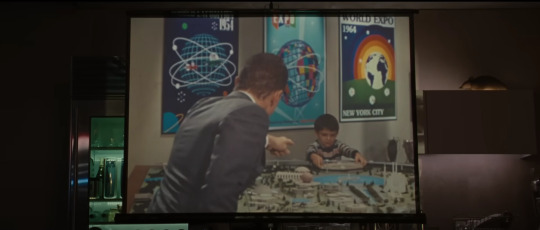

As Howard rushed to prepare Tony to become "the messiah", he discouraged him from normal childhood activities and behavior, even when Tony was 4 years old. His parents were not present in his life emotionally from the beginning, and later they were also not present physically. From the age of 7, Tony lived in conditions that children much older than him usually live in, with those older children, not with peers. His activities there consisted mainly of studying science and technology. He couldn't act like the child he actually was. And in college, when he was still a kid, he was thrown into the community of college students. Not the proper environment for a child.
From his perspective when he recruited Peter in CW he was recruiting a 15-year-old himself, who, in many ways, was already an adult.
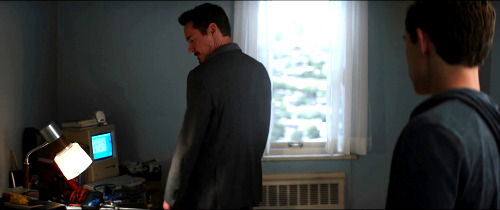
However, these misfortunes in the future allowed him to easily find a common language with children like Harley, Peter, and Morgan. His inner child understands them, knows what they want and need, how they think. He does not talk down to them and treats them as equals. He also knows what to get Harley for his help and how to be a great father - because he can see from both perspectives.
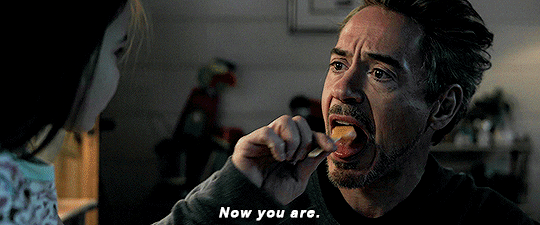
Conclusion: Tony was deprived of the opportunity to be a child, which affected his psychological development, leaving him a bit of a child in his adult life. This had its pros and cons, including some difficulty communicating with other adults, but at the same time, it made it easier to communicate with children.
It also gave him a somewhat distorted view of childhood (thinking that other children were just like him - practically little adults), which gradually faded with the experience of caring for a "regular" teenager.
All these features also allowed him to become a wonderful father in contrast to his own.
#tony stark#iron man#marvel#mcu#the avengers#avengers endgame#pepper potts#iron man 3#iron man 2#peter parker#captain america civil war#howard stark#morgan stark
61 notes
·
View notes
Text
I think one of the most annoying takes I see about TCOAAL is when someone says Ashley is solely the problem and that Andrew is completely innocent…💀 like did we play the same game?? Ashley and Andrew are the same, they always have been. Andrew just hides it better, but we see his mask slip in Ch. 2.
In a comment section on YouTube I literally saw someone say “Andrew needs to realize that Ashley is a bitch and leave.”… I rolled my eyes 🤦🏻♀️ lmao, like alright are we just going to completely ignore everything Andrew did? I’m convinced that person didn’t actually play the game.
I’m going to die on the hill that Ashley and Andrew weren’t born evil. The two of them are a product of their environment, especially Ashley. We see that her parents never cared about her and that her “friends” weren’t actually her friends. I’m sure we’ll see more of this in Ch. 3, I already know it’s going to make me sad ughhh. Ashley’s been treated like shit by everyone around her it seems except for Andrew. Andrew has been the only consistent presence in her life, the only one who’s ever been there for her. The flashback from her birthday was so fkn sad, but Andrew tried his best to make it special for her 😭. When she called him her favorite lemon muffin 🥺 yeah, she loves him downnn.
Ashley also has major self esteem issues which absolutely stem from her childhood. Again, I think we’ll see more of this in Ch. 3. She also has a ton of internalized misogyny, she’s had it since she was a kid. I’m like girl.. why are you like 10 calling other girls hussies? 😂 Seriously though, I believe she picked this behavior up from her mother. I mean where else would she learn those words and behaviors from? It’s very easy for kids to pick up on things. I really need the lore on Mrs.Graves because I don’t think she was born evil either. 🤔 The fact that she was a teen mom of 2 before the age of 18 is crazy. That also means her and Mr.Graves have been together for quite some time.
We know Mrs.Graves overall doesn’t care about either of her children, but it’s fair to say that Andrew was treated somewhat better than Ashley. I bring this up because I’ve heard stories about how some moms are easy on their sons while being very hard on their daughters. Also, I’ve seen someone else bring this up before, but when Andrew declines the olive branch and defends Ashley, Mrs.Graves doesn’t understand why and then she accuses him of sleeping with her. Why did her mind automatically go there? As if he couldn’t love Ashley for any reason other than sex. I think the reason Mrs.Graves said that is because of her own internalized misogyny and is projecting. Basically saying: If a man cares about you and does things for you, it’s obviously because you’re sleeping with him, not because he actually wants to do those things out of love. I could be wrong though, that’s just something I picked up on. So yes, I do believe Ashley got her internalized misogyny from her mother. I think generational trauma is definitely at play here, which is honestly just sad more than anything.
Andrew is everything to Ashley, he really is the center of her world 😭, and he’s the only person who’s shown her any type of love. We know she’s terrified of losing him and will do anything to keep him around. Considering no one else has stuck around in her life, it makes sense that she has serious abandonment issues 😞. Ashley can be abusive and manipulative, but I don’t think she necessarily wants to do that, she does it because she thinks that’s the only way she can keep him in her life… what she doesn’t understand though is that Andrew loves her just as much as she loves him, he would stick by her without any of that, we know this, even though he doesn’t show it as much. In ch. 3, I’m sure we’ll finally see him open up more and give her the affection and reassurance she needs. We see a glimpse of this in the questionable burial route when they’re on the bridge. In my opinion, I don’t see how people can call the questionable route the “bad” ending when both of them look the happiest, especially Andrew. I don’t think I’ve seen Andrew that happy at any other point in the game. 💀 he was fr in his element there.
Some people may not want to admit this, but Ashley is a victim as well. That’s why it’s frustrating to see people with the take that Ashley is purely evil and that Andrew is an angel who was manipulated to do everything he’s done. They’re both flawed individuals, but their upbringing was awful and the world around them is awful too. They live in a dystopian society. How they ended up was inevitable, and I’m not excusing their behavior, but they were failed by their parents and had 0 parental guidance. I mean my god, to make things even worse, their own parents sold them to organ harvesters and they were left to starve locked up in an apartment for months with no one else but each other. If they didn’t do what they did, they would have died. 🤷🏻♀️ They originally didn’t plan to sacrifice their parents either, they wanted to rob them and leave, but their mother came home and it screwed up their plans. Their mother absolutely would have snitched on them if they didn’t take action. We also know now that people are looking for them, hence the hitman. They literally have no choice but to be on the run. Their situation and actions aren’t black and white.
~
This turned into a very long post, sorry if it’s messy haha. I just wanted to get my thoughts out there because some of the takes I’ve seen on this game are horrendous. 💀 Thanks for reading if you did. ❤️
#tcoaal#the coffin of andy and leyley#nemlei#kit9#ashley graves#andrew graves#andrew x ashley#andy graves#leyley graves#andy x leyley#gravecest#coffincest#mini essay#didn’t expect this to be so long oops
84 notes
·
View notes
Text
𝖡𝖺𝗋𝖻𝗂𝖾
୧ ‧₊˚ ⋅* ‧₊ I hope this reading found you in good health, every reblog is appreciated and thank you for everything :) ˖♡ ˎˊ˗ ꒰ 🐇 ꒱


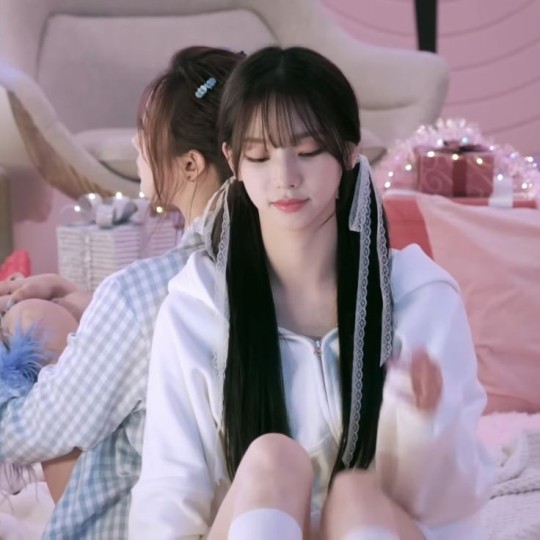
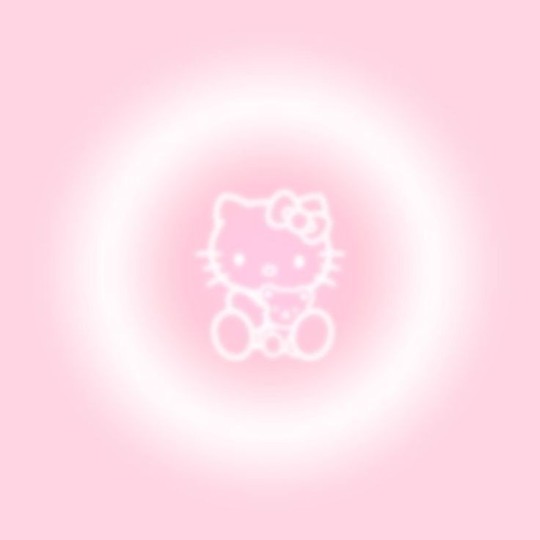

˗ˏˋ༻ʚ♡︎ɞ༺ˎˊ˗ PAID SERVICES

⸼ ۫ ︎︎⊹ ! 🪡︎ Pile 1 ꒱
꒰ Connecting with your inner child ꒱
Mentally, you were not doing very well as a child. You were raised in a way where your family or caregivers made you feel like it was alright for you to be mistreated. Due to how you were treated at home, people treating you unfairly in other environments, such as, school, etc. felt very normal to you, ofcourse, it hurt you but you knew that your family would not have your back so you had to stay quiet about it. You chose to live in a lie, you were in denial of your parent or whoever raised you being a bad person. You idolised them throughout your childhood and let them get away with everything. They didn't even apologise when they hurt you, they didn't take accountability for their actions, they made you feel like everything was your fault. When you made a mistake, even if it was a tiny one, you were heavily criticised. For most of you, you were even called names, names that no one should call anyone and especially not their children. You were extremely critical of yourself, this is heartbreaking. You likely grew up in an environment where, people were hypocritical, for example, your parents are both alcoholics who curse a lot and are abusive (this is a similar situation to most of you) but they expected you to be nice, gentle and you were not allowed to make mistakes. I'm crying, I cannot deal with how heavy this energy is. Your childhood was so lonely but you chose to blind yourself to that by idealising it.
Your family members might have used you to lie to others, lied on your name, etc. and you were a child, twisted the story whenever you tried to stand up for yourself, etc. Some of you had a single parent, divorced parents or just problematic parents which caused you to be exposed to alcohol, sex, jails, etc. quite early on in life. Physically, you were a good kid. You wanted to get good grades, have a good reputation and you worked hard on it. However, it was not a natural wish, it was forced upon you so that you could gain your parents approval. You were not loved even when you achieved things but you kept on pushing. Your parents might have told you things like "you need to work hard so that you can clear ___ exams and then become a successful government servant/doctor,etc." and you heard it so much that you naturally thought that your parents would only love you after you achieved that milestone. You enjoyed it because that was the only way you could possibly have hope for the future. You were so young but you still tried to have routines, etc. Honestly, you were the parent here. You were working hard so that you can provide for them in the future and you were just 9 years of age at that time. You were considered to be a gifted kid or a trophy kid and you enjoyed that validation because you were denied of basic emotional nourishment, validation and affection that a kid should receive.
No one could've guessed that you were struggling because not even you were aware, you seemed to be doing really well physically, achieving your goals and looked happy while doing so but you felt empty on the inside. You were critical of yourself, including your appearance and picked out every flaw of your body. Emotionally, you had issues at school too. Even though, on the surface you seemed very confident, that confidence was solely reliant on the validation that you would receive for accomplishing something. Your parents seem to have been very serious about your future, they probably enrolled you into a good school where kids with rich parents also used to go and you felt really inferior to them. You became emotionally reactive and immature as the years progressed because you were just a kid who didn't have their needs met. No matter how hard you worked, you felt like you were an underachiever. This makes me sad, I'm getting the vision of a kindergarten student receiving silent treatment from all the other students around them and then going home, studying, probably taking care of a younger sibling and having the mother come home and beat the child over a small disagreement at dinner. You deserved better, you really did. You deserve all the love in the world. Please take good care of yourself. Physical or emotional abuse and neglect seem to be a theme here.
꒰ How did your inner child imagine your teenage and young adult self to be like ? ꒱
'You can be anything' is the slogan of Barbie and as a kid, there are so many possibilities, we're more imaginative than ever. We imagine what our teenage and early adult days will look like. We'll look at who they (your inner child) wanted to be, how they envisioned your teenage and young adult self and days to look like.
Your inner child expected you to have romantic experiences. They imagined that you'd have a crush on someone and receive proposals. They imagined you as someone who had beauty and style on their mind, almost 24/7. They imagined you wanting to buy make-up products, clothes, bags, etc. and actually receiving them. They imagined you as someone who could do something artistic like play instruments, dance or draw. They imagined you as someone who is caring and has a gentle attitude. They imagined love letters, friends and just a lot of emotional involvement. They imagined you being able to physically cry to a friend or a lover who will actually listen to you. They imagined you feeling content in life and gaining a lot of wisdom. They imagined you being able to let go of anything that has ever hurt you. They imagined you living a life full of hope. They imagined you feeling loved, happy, going to bed after having a good time with friends or partner and tired after such a fun day and wanting to wake up every morning. They imagined you having a lot of passionate experiences and knowing how to let go of anything that makes you feel stuck. They imagined you to look to your past and life lessons to help you gain clarity. They imagined you as someone extremely successful too. "I'll have my life figured out by the age of 18." They imagined you as being composed, forgiving and decisive. They imagined you kind of making a change or something. Maybe, just being a good influence and having a good character. They imagined you having a lot of experiences and learning from them. Knowing how to live life. They imagined you being able to release past guilt and grief, they imagined you having a healing group environment. They imagined a 'happy ever after'.
꒰ What kind of a Barbie have you become ? ꒱
The kind of Barbie that you've become is kind of reckless. You've become kind of impatient too. You've become very cautious of things and end up projecting a foolish or immature image in order to be underestimated so that people don't try to get between you and your goals. You are kind of a thrill chaser as a Barbie but it's because now, you understand that you are more than just the expectations placed upon you. You've become a Barbie who can sometimes be overly optimistic. Your Barbie's name would likely be something like 'create your own identity Barbie' or 'self love/respect Barbie'. However, you're also a Barbie who's accepting themself or has already accepted themself. I think you're going through some sort of a reality check just like Barbie did or you've already undergone it. You've become the cycle breaker Barbie of your family. You're an independent Barbie. You're a Barbie who's focused on shadow work and healing. You've grown to be extremely courageous and are little by little, letting go of the limiting beliefs placed upon you. You're a Barbie who breaks past the identity that others had made for you to fit into. You have a focused mind and have self respect. You are a self controlled individual and try to be as accountable as humanly possible. You're a truly lovely Barbie.
꒰ Messages from your inner Barbie ꒱
"Always take time to be grateful for yourself, your body, your heart, your life. Fill your cup first and this will extend outwards."
"Be so graceful and beautiful, inside out that everyone's eyes will be on you and they'll see you as an inspiration."
"Reconsider."
"Ask yourself if the highest version of you would do that."
"Participating will help you learn better."
"You deserve everything good and divine."
"Your actions and priorities should align with your needs and desires."
⸼ ۫ ︎︎⊹ ! 🪡︎ Pile 2 ꒱
꒰ Connecting with your inner child ꒱
I think for most of you, a male figure really affected your mindset as a child especially. You used to think about this man a lot, maybe it's your father or grandfather. They taught you a lot about power and social status. They might have told you things like "be friends with this kind of people, don't be friends with this kind of people." This man was definitely very ambitious though. However, your mental well-being as a child seems pretty good. Situations at home seemed to be under control, nothing for you to worry about. You really respected this man though. They made you feel safe and protected. They taught you a lot about discipline. Mentally, you were able to grow and flourish because of the environment. You were pretty logical, even as a child. You set out goals for yourself that you wanted to achieve, even if it was something as simple as "I want to be able to take a bath by myself." You learnt how to be firm and decisive. Either, you were a single child or just not willing to share your things, food, snacks, toys, etc. Did you come from a wealthy family? You might have been kind of a show off as a kid, no shame ofcourse, you were a literal child. You were physically and materially taken care of though. You knew how to flatter your parents in order to get what you want and often, you did not even have to flatter them, they just wanted to give everything you wanted. However, sometimes you had to do things by yourself or you actually wanted to? You wanted to be self reliant or were forced to be.
Your parents might have been really busy or even away from home, your needs were taken care of but there were times when you felt lonely. However, because of the support of your parents, you dealt with it pretty well. For the rest of you, you might have had major issues emotionally, I heard 'seperation anxiety'. Maybe, because you were a rich kid who used to show off your wealth, others used to leave you out or tell you hurtful things and you'd be really sad about it. Some of you likely struggled with insomnia quite early on in life. You might've witnessed a death or a loss of a loved one quite early on too, before that you might've been really happy but temporarily, you were really hurt and sad. Oh, also a financial downfall might've occured. There were also some family feuds, I think it could be over inheritance or money. You felt quite bored though, like you had money but it failed to entertain you. Maybe, whoever this male figure was, had to move away and you were left feeling really anxious. You could've been quite cold and for most of you nepotism or connections did help you. As, you were a child, your decisions were definitely influenced by others. You might've been mean to others too. Emotionally, you started being more comfortable as you continued growing. You felt quite excited about life and started being more optimistic. You were inspired by the people you watched to become successful and happy. You were excited about possibilities and were passionate about almost everything.
꒰ How did your inner child imagine your teenage and young adult self to be like ? ꒱
'You can be anything' is the slogan of Barbie and as a kid, there are so many possibilities, we're more imaginative than ever. We imagine what our teenage and early adult days will look like. We'll look at who they (your inner child) wanted to be, how they envisioned your teenage and young adult self and days to look like.
They imagined you starting over. They imagined you confessing all the bad things you've done and being able to move on. Did you watch a lot of shows like 'mean girls'? They imagined you being kind of two faced. They imagined you facing a lot of betrayals. They imagined you not being able to trust people easily and letting people into your life only if they deserve it. They imagined you watching what you'd say to others, it's because you've been taught to care about reputation. They imagined you hearing rumours and gossip about yourself and going "and I was like, why are you so obsessed with me?" They imagined you taking responsibility for your own actions and apologising to those who you've wronged. They imagined you having your life together, and being able to take care of yourself and responsibility over your finances. They imagined you treating everyone equally and with respect. They imagined you sharing your wealth with others (charity, etc.) They imagined you being grateful for what you have. They imagined you having others try to help you financially too. They imagined you as someone generous and compassionate. They imagined you being at peace with yourself and being able to reciprocate others' love and affection. They imagined you being really kind and taking care of others out of goodwill. They imagined your life being extremely dramatic. They imagined people being exposed and you having to remove them. They also imagined you making assertive decisions and being able to see things clear. They imagined you being open-minded and taking time out to sort out your feelings and confusion. They imagined you knowing and setting your boundaries. They imagined you being able to be really calm about decision making. They imagined you having a purpose, a direction in life and going after that. They imagined having to let go of a lot of emotional ties and you being calm despite all of it.
꒰ What kind of a Barbie have you become ? ꒱
Mentally, you have a lot of thoughts racing which cause you to lack balance. Your thoughts don't seem to be organised. You tend to be overwhelmed quite quickly and are prone to impulsive behaviour. Your time management skills seem to be lacking too. Maybe, you're burnt out and really need a time out. You seem to be quite abundant financially or will be. You're quite confident and boastful too. You know how to value yourself and take good care of yourself, physically. You are grateful for everything that you've achieved so far. You seem to be quite content and satisfied, especially financially or achievement wise. You seem to have success in all areas and might be quite popular among others. Your wishes seem to be fulfilled and even emotionally, you're quite happy. You are an entertaining person and have entertaining people around you. Whenever, you're feeling sad, you always find something or someone to be grateful for, to be happy about. Emotionally, you've grown to be accepting of loss and change. You might be adjusting to a different way of living life. You have a lot of hope for a fresh start and are healing as a person. You've let go of the past and don't let it affect your present, any longer. You're resilient, and know how to overcome your problems and rise to the top. You know how to learn from the past, even though you might've struggled with complete ruin at some point. I wonder what your Barbie would be named 'learnt her lessons Barbie' or something along those lines.
꒰ Messages from your inner Barbie ꒱
"Don't take action just for the sake of taking action."
"Maybe you expected a lot because you were willing to do that for them."
"The grass is greener where you water it."
"Be honest with yourself."
"Don't worry about things that will never happen."
"Happy heart, private life, peaceful life, abundant pockets."
"Dopamine detox is important for you, having a phone addiction will not help."
⸼ ۫ ︎︎⊹ ! 🪡︎ Pile 3 ꒱
꒰ Connecting with your inner child ꒱
Mentally, you were suffering. You might've been a child who worried a lot. You felt lost and might have even had anxiety that might've not been diagnosed. You felt like none of your wishes came true and used to have moments when you used to lose hope. "I used to pray everyday but my life just kept on getting worser." You were a child so ofcourse you didn't know yourself but the loss of purpose that you felt made you feel miserable. There were events and occurrences that led you to feel insecure about yourself. People used to have unrealistic expectations of you and when you failed to match up to them, you felt awful, they made you feel like it was your fault. You might've spent your childhood in a very monotonous manner, go to school, come home, study during holidays and go back to school again. At that time, the only thing that kept you going was the blind faith that things would eventually be alright. Some of you used to have suicidal thoughts, some of you used to wish that you never woke up. You are really courageous. You might've had to travel sometimes but it was still kind of monotonous
You were just going to the same place again and again, every vacation, just rotting in a house at that place. You were very restless physically, while some of you took up sports or something like that, some of you used to just walk around a lot, could not sit in one place for a long time. This is actually truly depressing, you used to wait for things that you never received, the help that you never received. Emotionally, you repressed a lot of trauma. You used to be really guarded as a child, so, I'm not getting what exactly happened. You used to be very forgiving though. Any expression of pain and anger caused you to undergo even more pain and sadness so you naturally started suppressing all of it. You kind of stayed stuck to those heartbreaks and suffering, you've just internalised and kind of saved all of it. It's like, you saved something to a private file but forgot the password and it turned out to have a deadly virus. You've always let go and forgiven but it took a toll on you mentally and emotionally especially since, it resurfaces as you continue growing. I think inner child healing is extremely essential for you.
꒰ How did your inner child imagine your teenage and young adult self to be like ? ꒱
'You can be anything' is the slogan of Barbie and as a kid, there are so many possibilities, we're more imaginative than ever. We imagine what our teenage and early adult days will look like. We'll look at who they (your inner child) wanted to be, how they envisioned your teenage and young adult self and days to look like.
BLAIR WALDORF !! They imagined you as being kind of selfish. "You need to be cold to be queen, forget boys, keep your eyes on the prize, Jenny Humphrey. You cannot make people love you but you can make them fear you." They imagined you partying and stuff. They imagined you as someone who respects themself. You might've sometimes fantasized about hitting people who tried to mess with you on the nose. They imagined you as someone quite courageous, someone who runs after their goals. They imagined you accomplishing things after things. They imagined you having a dramatic life though, heartbreaks, mental illnesses, etc. They imagined you undergoing life changing events and gaining morals. They imagined you as someone really loving and compassionate too, when needed. They imagined you having a lot of inner strength and being able to overcome self doubt. They imagined you as someone with a strong sense of responsibility. Even as a kid, you were aware of the demons inside, you imagined being able to tame them through your experiences in life. They imagined you always winning. They imagined you receiving romantic proposals. Being invited to lunch, parties, etc. They imagined you following your heart and being really chivalrous. They imagined you being quite sensitive emotionally and also graceful in everything you do. They imagined you being swept off your feet and having a lot of warmth in your life. They imagined you meeting people who you're attracted to, etc. They imagined you having an active imagination, and using your charms and emotions in order to attract partners. Maybe, your inner child is in love with the idea of love. They imagined surprising and exciting events occurring in your life. They imagined you exploring your passions. They imagined you having a good nature and falling in love with people with a good character.
꒰ What kind of a Barbie have you become ? ꒱
'Never gives up Barbie' that's what most of you have become. You guys have a poor work ethic and no motivation or discipline. You should try to set out goals for yourself. You also struggle with teamwork and might be going through a rough patch currently. I'm getting loneliness and misalignment here. You want to grow but do not have the commitment to. You have been left out quite a lot and might be used by others. I think that this is not your true essence, you're just going through a really rough patch and have been in this energy for so long that, you aren't sure about who you are. Some of you are very young so naturally have not started working on yourself, yet and most of you come from a place where most people never tap into their full potential. You come from a place where if you are trying to get better people get offended, like, "who do you think you are?" You kind of let others take advantage of you. Shining bright means receiving hate and hate scares you. If not, atleast, you tend to be overwhelmed by other people's opinions. You seem to have a history of having gotten ganged up against and it's so scary to you. People who see your potential and see you rising, try to intimidate you. I think you are working on building stronger boundaries though, at this point. You might've or still struggle with people pleasing tendencies, so, you tend to compromise a lot for people who do not deserve it. Most of you are burnt out too, maybe, you worked so hard in school or whatever for your entire life but now you just cannot find yourself being able to do anything anymore. This is changing though, you are changing emotionally and it will start to affect the way you act too. You're shedding your old skin right now, most of you are done with being in the sidelines, you wish to be a winner. One thing about you is that you never give up. You're constantly evolving yourself and pretty much being born again. You are going through a hard ending that is starting to feel easier now that you can see it as a new beginning. Take care, rooting for you !!
꒰ Messages from your inner Barbie ꒱
"Not sacrificing will sometimes be your biggest sacrifice."
"Be afraid not of going slow but of standing still."
"Negatives count."
"Slow progress is still progress."
"It's never too late to start."
"If grief is the price of love, tears should be your only proof."
"Maybe, you expected a lot from them because you were willing to do the same for them."

#intuitive readings#pac#pac reading#pick a picture#pick a gif#astrovations#pick a card#pick a deck#pick a photo#astrology#astro notes#astro observations
337 notes
·
View notes
Text
Astro observations bc it turned into one ⭕️

Pinterest
I’m fucking trying to do a short post again but my overthinking powers are gaining me. I fucking hate myself, this post was supposed to be a family astro observation post and then I turned it into a moon sign post and then into an astro observation post, and you know what?! IT’S MARVELOUS OKAY
Disclaimer: we have to imagine everyone has a functional family 🤩
Taurus moon child tends to be the mommas kid. They just love the comfort in those hugs, it gives them peace or certainly a mom-son moment. They could (would) appreciate it daily. (sorry for those motherless taurus moons)
The Gemini moon kid ALWAYS have a mom that is not certain a mom, they don’t fit in the prototype of a traditional mom. The mom of these children are working, or hate doing stuff like buying school material for their children, they could not even listen to their kids when they’re talking…I don’t fucking know too specific I know I feel like the kid could have felt that the mom was in her own world, thinking and thinking, spacing out, that they couldn’t relay on them, sometimes.
Aquarius mercury 12H kid please just shut the fuck up. Well I mean, don’t but yes. First, yes because you have so many reasons to speak out. About the things that you perceive (too much bb, you’re like a sponge😭), the injustice, etc., also about the introspection you have done and the very strong emotional depth you have to deal with but you don’t want to and let almost nobody know about it blablabla … Everything is peaceful and harmonious until you decide that the best way to approach is to be taken by your impulses and the strong emotions you feel, to finally speak out. Aquarius mercuries always think they’re right, so stubborn, will think that their idea is better. It could be so hurtful to others, the words you say without thinking how it would affect them. Winning an argument is not always satisfactory. You have to know, I’m just saying 😟🤭 Please, take a deep breath and repeat with me: “I have the ability to control myself, open my mind and see that even if I’m suffering and feel TOO MUCH it hurts, it doesn’t mean I have the right to hurt others with my actions and CERTAINLY words. It’s important to prepare or think what I’m about to call out, because nobody it’s going to take me serious if I yell uncontrollably”. Poor parents (not true fuck them no lie no fuck them like yes but no), everything is injustice, the way they treat you, blablabla etc. (I’m not a fan of supporting parents) I was going to turn this into a child observation and I deviate from the topic. Kill me please. omfg I’m so dramatic.
People with Gemini rising are SO OVERTHINKERS, THEY THINK TOO MUCH. I know it’s too obvious okay? They’re so logical, they think twice, not twice, 462946 times before doing something “risky” (that’s not even risky, for me at least). If I said “Do it for the experience”, they’re not going to deny the idea at first, but they’re going to stay forever in their minds and think if it’s a good idea, the pros the cons, the people, environment, etc. everything you could imagine. They’re gonna be like “I don’t knooow”, and start making questions about the plan. They take their time. And the more they think the more pessimist they turn and finally they’re gonna decline. They are going to ghost you or take a pause or not going to confirm. But these implies only and most if you ask them out or on an event situation, something that has to do with changing environment or simply take them out of their house.
Not in the way Libras sun do, they meditate the idea to make the best decision -I’m not saying Gemini risings don’t do that-, and they could be so indecisive in routine questions, like if they ask them “what do you want? chocolate milk or normal milk?” or “Should I put these pants or these ones?” I’m the libra sun I DONT FUCKING KNOW OKAY? IM IN MY FUCKING MIND AND I HAVE TO DRESS THE WAY I FEEL AND THE OCCASION OF COURSE AND THE…😭PLEASE HELP ME
—•—•—•—•—•—•—•—•—•—•—•—•—•—•—•—•—•—•—•—•—•—•—•—•—•
•This is based on my personal experience.
•English is not my first language.
•I’m not a profesional astrologer.
Thank youu. baibaiii🫣🫶🏼💋
Do not copy. Please give me credits.
#astro observations#astrology#libra sun#12h placements#taurus moon#aquarius#aquarius mercury#gemini#gemini moon#taurus#gemini rising#pisces moon#astrologia#sag venus#pinterest#thisisnotmyfirstlanguage#fuck it#astro notes
439 notes
·
View notes
Text
The big analysis of Joris Jurgen's horrible-no-good childhood.
TW: discussions of child neglect, and what might constitute as emotional abuse.
Firstly, to address something, I hadn't in the last liveblog:
There are plenty of times in the show where one can see Joris saying things that he may not entirely mean...
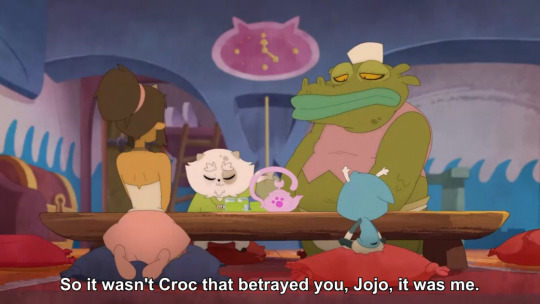
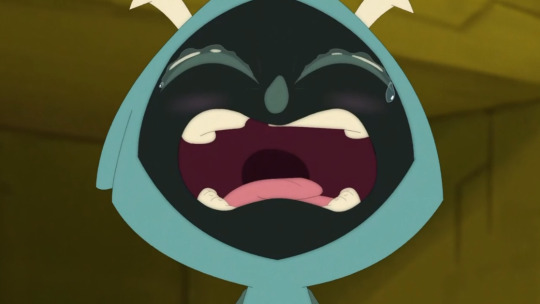

But it is especially interesting to see him say something like this immediately after breaking down into tears about it just a scene prior.
Hm. Anyway. I'm sure this won't affect their relationship going forward.


I've discussed Kerubim's issues of self-worth, loneliness, and dishonesty, before on this blog, — but you will never believe it, Kerubim isn't the only one who suffers because of his issues.
It's nigh time we discuss seven-year-old Joris, and the terrible, no good, case of emotional repression and lying.
Let's set the stage first.
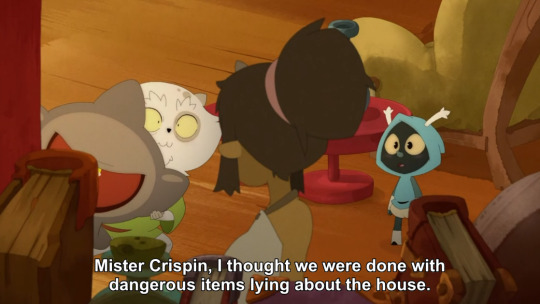
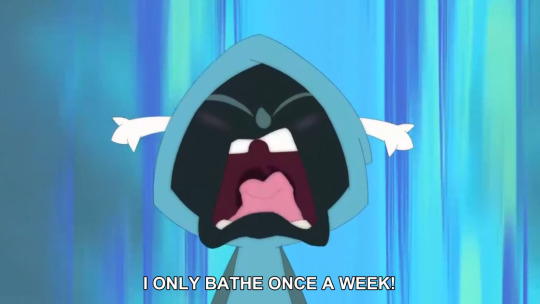


Joris grew up in a deeply isolated and neglectful, and at times dangerous, environment, in every single way. And the child neglect Kerubim engaged in lessened, but did not stop after Simone arrived.
He did not have any family members besides Kerubim, — for obvious reasons, both of their family members are either dead, or want nothing to do with them, — and he did not have any friends, besides Tatak. The reason he did not have friends is unknown, but there are several factors that may have contributed to that:


The sorry state of their house might have complicated his relationship with other kids and given him and Kerubim a poor reputation among neighbours;
The part of the city they live in might simply not have a lot of families, due to being a — being, perhaps, mostly populated by adventurers and other people in violent professions, as well as the shops that cater to them (which are, in turn, mostly ran by retired adventurers).
And then there's the third thing: Kerubim is his best friend.
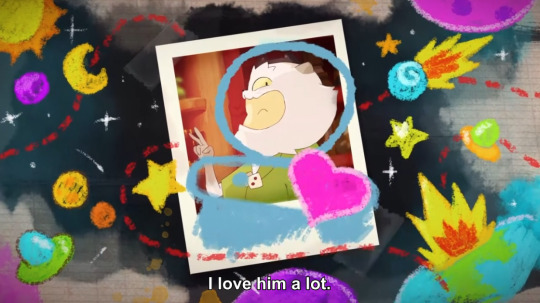
Joris did not have a support system in the form of an extended family, — or at the very least, in the form of friends outside the household, — and It doesn't seem like the other adults Kerubim knows were at all involved in Joris's childhood. Besides that, Joris was seemingly homeschooled, — and, considering Kerubim's finances, and his referencing at least one school's existence, there were other options.
For the large part of Joris's life, they only had one another, and it almost seems like Kerubim, with his abandonment issues, and low self-esteem, acted in ways that isolated Joris further.
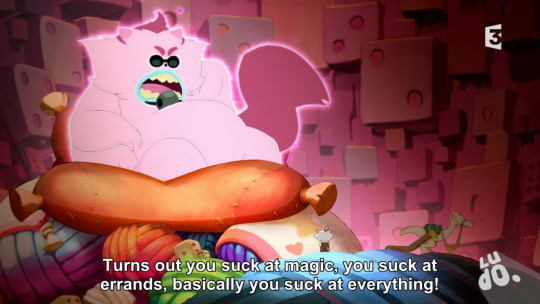
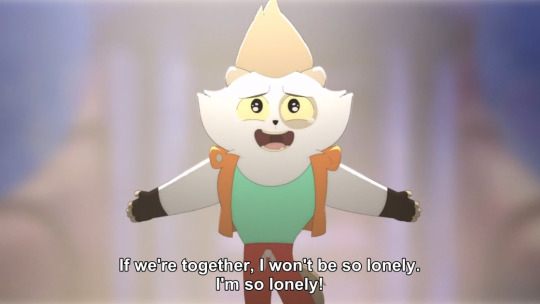
Due to Ecaflip's mistreatment of him as a child, and his loneliness due to the death of his family when he was a child, — what he wanted the most as a father was to be a best friend to Joris.
(And, much more selfishly, not that he would admit that, — he wanted someone to replace Lou/Indie/Atcham/Bashi/Everyone else who has left him.)
He could remember being a child, and he knew how he would have liked to be treated, — as a peer, obviously. It's important for peers to respect each other equally, and listen to each other's pain, right?

Except, in a way, Kerubim is perpetuating a cycle here.
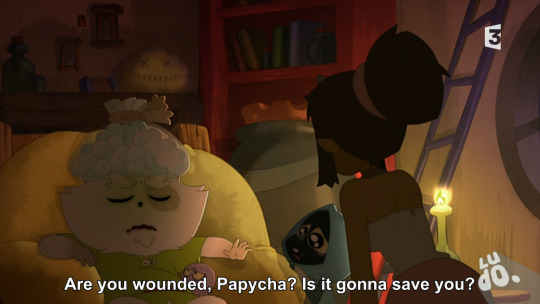
And children are not peers, best friends, or caretakers. They depend on their parents for their survival.
And Joris knows what will happen to him, if Kerubim is gone. Kerubim himself was an orphan, and has shared more than enough stories about that.
Because of this, thoughts of Kerubim passing away are a usual worry for Joris, no doubt fueled by Kerubim's dramatics, and love for his attention — and it means he'll do everything to make sure Kerubim is happy and healthy.
Even if it means sacrificing his own comfort for his sake. Even if it means putting up with being treated badly.

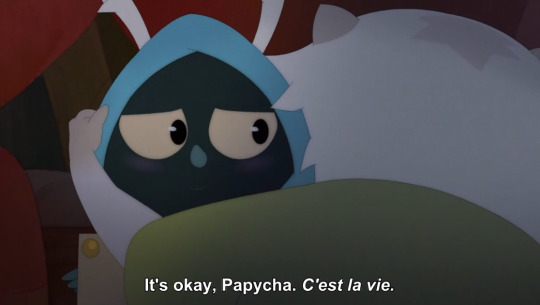
Joris and Kerubim have what is known as an "enmeshed", or "codependent", parent-child relationship, the characteristics of which are, according to online resources:
Parents expecting children to be their best friends and always confiding in them.
Children receiving praise for maintaining the family’s status quo, and conflict-avoidant behaviours.
The lack of emotional and physical boundaries.
Role reversal, in the form of the child being expected to take care of the parent's mental health. (Despite lacking the maturity to)
Children prioritizing parents needs and feelings over their own.
Childhood overindulgence, in the form of the parent using the child for wish fulfilment.


Another interesting titbit that informs his character, is that, from a very young age, children learn how to respond to their feelings and express them, based on the way adults behave, by mirroring those behaviours, — and Kerubim is anything but honest about his feelings, more often than not, putting on a brave smile.
Joris values his stories more than anything, despite knowing that, often, they may be fake, at least in some parts. To him, words matter more than the truth of the matter, when push comes to shove between them. But also, he doesn't like outright lies, which are just as plentiful between them.
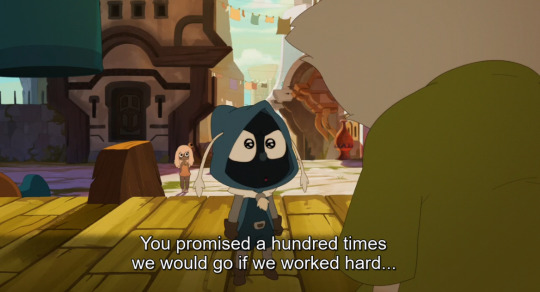
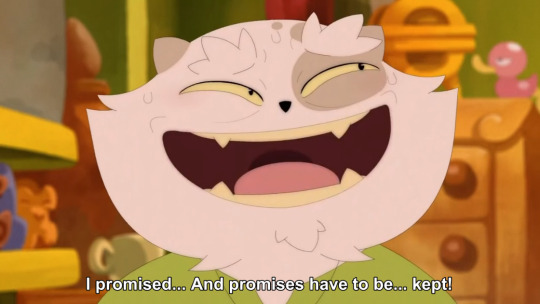
Despite how he may usually act, Joris isn't really the happiest about how their family is. He knows that Kerubim is dishonest and neurotic, and, in a way, it causes dissonance in his mind. He loves him more than anything, and to trust him, — but he knows that to trust Kerubim is to be disappointed.
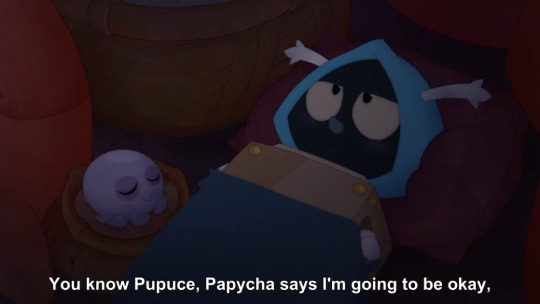
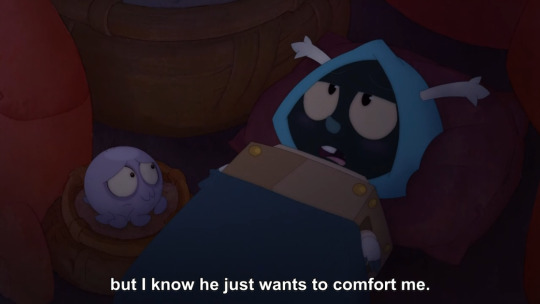
When something bad happens? It's a guarantee, that instead of being comforted, it will be his job to pretend to be comforted, so that Kerubim doesn't completely fall apart. So that he can still be taken care of, — and every child wants to be taken care of.
Yet another thing he can't really trust Kerubim with.
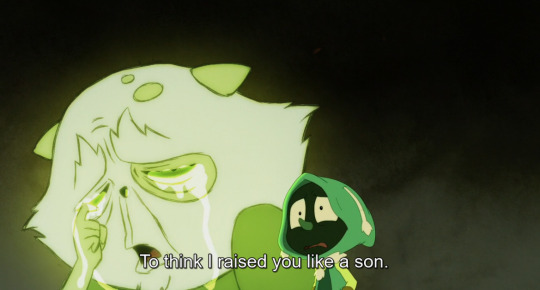
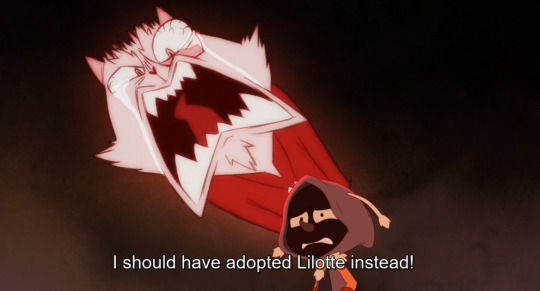
Just like Kerubim, he is growing up to be a good liar. And someone very much afraid of being abandoned.
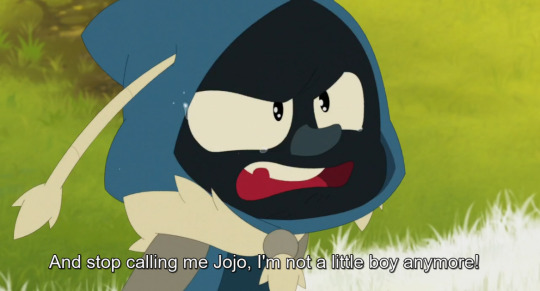
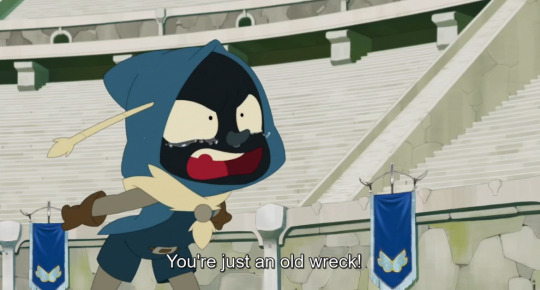
But everyone has their limit, fear of abandonment or not. No matter how much you repress these feelings, they'll come bubbling to the surface eventually.

...An interesting tidbit about children raised in enmeshed relationships, is that, at times, as adults, they find it difficult to trust others, open up to people, or have close friends in general. Due to guilt of those people on the outside not being their family, and due to associating close relationships with pain, responsibility, and giving up a part of themselves.
They grow up to be aloof, flighty, and cold.

Another interesting tidbit is that, sometimes, they find themselves unable to leave at all.
#ep48#- only on a technicality. because the post begins with that episode's ending#ro liveblogs dofus#joris jurgen#dofus#krosmoz#wakfu#kerubim crepin#because im slam dunking him here. DIE old man
95 notes
·
View notes